ON SKATING THIN ICE







The Bar Review
The Bar of Ireland
Distillery Building
145-151 Church Street
Dublin DO7 WDX8
Direct: +353 (0)1 817 5025
Fax: +353 (0)1 817 5150
Email: molly.eastman@lawlibrary.ie
Web: www.lawlibrary.ie
EDITORIAL BOARD
Editor
Helen Murray BL
Patricia Brazil SC
Michael Conlon SC
Tom Flynn SC
Clíona Kimber SC
Brendan Kirwan SC
Paul McGarry SC
Cathleen Noctor SC
Sean Ó hUallacháin SC
Peggy O’Rourke SC
Lydia Bunni BL
Dearbhla M. Cunningham BL
Elizabeth Donovan BL
Declan Harmon BL
Michael Kinsley BL
Cian McGoldrick BL
Catherine Needham BL
James Nerney BL
Una Nesdale BL
Emer Ní Chúgáin BL
Tim O’Connor BL
Michael O’Doherty BL
Morgan Shelley BL
Alison Walker BL
Ciara Murphy, CEO
Vanessa Curley, Law Library
Molly Eastman, Policy & Public
Affairs Officer
Paul O'Grady, Publisher
Ann-Marie Hardiman, Think Media
PUBLISHERS
Published on behalf of The Bar of Ireland by
Think Media Ltd
Editorial: Ann-Marie Hardiman
Paul O’Grady
Colm Quinn
Design: Rebecca Bohan
Tony Byrne
Advertising: Paul O’Grady
Commercial matters and news items relating to The Bar Review should be addressed to:
Paul O’Grady
The Bar Review
Think Media Ltd The Malthouse, 537 NCR, Dublin DO1 R5X8
Tel: +353 (0)1 856 1166
Email: paul@thinkmedia.ie Web www.thinkmedia.ie www.lawlibrary.ie
Views expressed by contributors or correspondents are not necessarily those of The Bar of Ireland or the publisher and neither The Bar of Ireland nor the publisher accept any responsibility for them.
The Bar of Ireland is committed to integrating environmental sustainability principles into our core business strategy and aims to be a leader on sustainability in the legal sector.
 Sara Phelan SC Senior Counsel, Barrister – Member of the Inner Bar Chair of the Council of The Bar of Ireland
Sara Phelan SC Senior Counsel, Barrister – Member of the Inner Bar Chair of the Council of The Bar of Ireland
The implementation of a Sustainability/ Environmental Strategy is one of the Council’s priority objectives for 2023/24, and the Environmental Sustainability subcommittee is working to encourage member participation and engagement, establish organisational goals for the future, and work with external bodies to progress our Environmental Sustainability policy. Apart from our national, European and ethical/moral responsibilities, improving environmental sustainability will bring many benefits to members by enhancing the environment in which we work and reducing energy costs.
An energy audit was carried out in September 2023, which made over 30 recommendations on how we can reduce energy usage. Smart Flow water meters
have been installed in the Church Street and Distillery buildings to enable the estates team to monitor and reduce overall water usage and identify leaks. A bin compactor has been installed to reduce waste volume. Sixty new bins for segregating waste have been placed in the Four Courts, Church St and Distillery buildings, and procurement and travel policies have been updated.
The subcommittee is engaging with the Courts Service and the Office of Public Works to have sections of the back lawn behind the Law Library rewilded, starting with a ‘no mow May’ policy. Due to the age of our buildings, upgrading works such as changing to LED sensor lighting and installing PV solar panels will require significant capital expenditure and therefore must be implemented on a phased basis over the coming
years, and this is being planned. However, we can all reduce our carbon footprint by becoming more aware of carbon consumption in our daily practice and taking steps to reduce it wherever possible.
Member printing and copying involved the use of 2.9 million sheets in 2022. Members will have seen a recent circular from the IT Department explaining how to remove the additional ‘remote job’ page that was included in print jobs. Further communications will be circulated with tips on how to reduce printing. Please think if you really do need to print.
Every week we are left with approximately 100 discarded folders. Empty folders are available for re-
use from the middle atrium in the Distillery Building and outside the issue desk in the Law Library. However, there are still too many folders going to landfill. The subcommittee is examining the possibility of working with the Courts Service and Law Society to devise a collective recycling system. In the meantime, play your part by sending the empty folders back to be reused by law firms.
All members are encouraged to carefully segregate waste using the special bins provided, and avoid using the general bins in offices in favour of the new ones. Tenants of offices in the Distillery and Church Street buildings will soon be invited to indicate if they wish to opt in to the ‘reduce waste’ initiative by dispensing with the need for a general office bin.
Finally, many members, either individually or through the Specialist Bar Associations, already play a significant role in activities to the benefit of the environment in terms of engaging with the public and policy makers on climate matters, strategic litigation and pro bono work. The Climate Bar Association enables members to become involved in practical initiatives. The natural justice campaign www.naturaljustice.ie is a Bar of Ireland initiative where resources and suggestions of ways to become involved may be found. The Environmental Sustainability subcommittee would like to gather information on these intangible benefits so that our positive impact can be recorded and reported. If you have any information about work you have done or ideas about what the Bar can do, please contact Leesha O’Driscoll SC. We can and should all be part of the solution!
With special thanks to Leesha O’Driscoll SC, Chair of the Environmental Sustainability subcommittee, and John Cronin, Estates Manager, for their assistance in compiling this particularly compelling Chair’s message.
This edition looks at a number of EU decisions that have implications for Irish law.

Helen Murray BL Editor
The Bar Review
On April 10, 2024, the European Parliament voted in favour of the new rules on migration, followed by their formal adoption by the Council of the EU on May 14. In our Closing Argument, David Leonard BL distils the issues and provides a comprehensive guide to this latest development in asylum and migration law. If ice skating hasn’t crossed your mind since Torvill and Dean, Mark Curran BL will have you humming Ravel’s Boléro as you read his examination of the impact and reach of the recent decision of the Court of Justice of the European Union in ISU v European Commission.
The European arrest warrant was designed to streamline surrender procedures for EU member states. Kieran Kelly BL considers the legislation and case law in the area, and the
circumstances whereupon the State can refuse to surrender an individual to another member state.
Martin Canny BL presents a detailed analysis of the law on business interruption insurance claims for policyholders who suffered loss as a result of the Covid-19 pandemic and the ensuing lockdown restrictions.
This edition also features a report from the recent World Bar Conference, jointly hosted in Belfast and Dublin by the Bars of Ireland and Northern Ireland.
And if that wasn’t enough to keep you up at night, we also have an interview with the Minister for Justice, Helen McEntee TD. The challenges surrounding the Criminal Justice (Incitement to Violence or Hatred and Hate Offences) Bill 2022 and the Family Courts Bill 2022 are just some of the topics discussed.
The Irish Criminal Bar Association (ICBA) held a joint CPD event with Clarus Press in conjunction with the launch of Miriam Delahunt’s new book Vulnerable Witnesses and Defendants in Criminal Proceedings. Séamus Clarke SC chaired the event and enlightening presentations were given by Miriam Delahunt BL and Mr Justice Paul McDermott. Topics covered included intermediaries for vulnerable witnesses and defendants, The Munster Trial (June 2021) and restorative justice. The fully booked event welcomed a range of attendees, including academics, solicitors, and social workers.
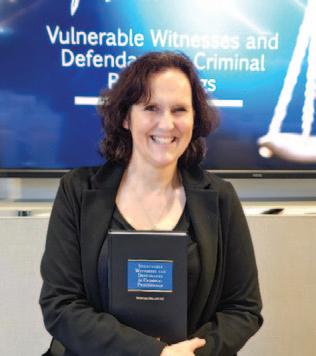
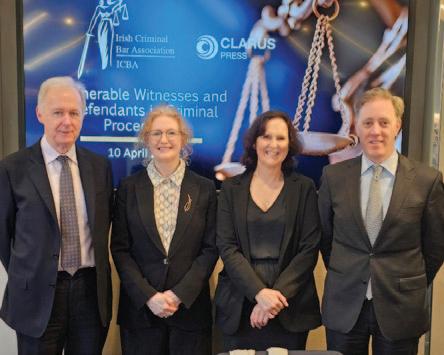


The EU Bar Association (EUBA) and Irish Criminal Bar Association (ICBA) held a joint event titled ‘The Impact of EU Law on the Irish Criminal Process’ on Thursday, April 25. The event was chaired by Mr Justice Maurice Collins. Seán Guerin SC covered topics such as EU Treaty history, transnational crime, and developments in the Court of Justice of the European Union. The second speaker was Jana Bambic, a Senior Legal Officer at the EU Public Prosecutor’s Office (EPPO). Jana spoke about the activities and operation of her office, touching on their investigation process, co-operation with EU member states, and the structure of the EPPO. At the end of the presentation, the audience was able to understand the recent impact of EU case law on the Irish criminal process, in particular in the area of data and privacy, as well as the activities and operation of the EPPO.
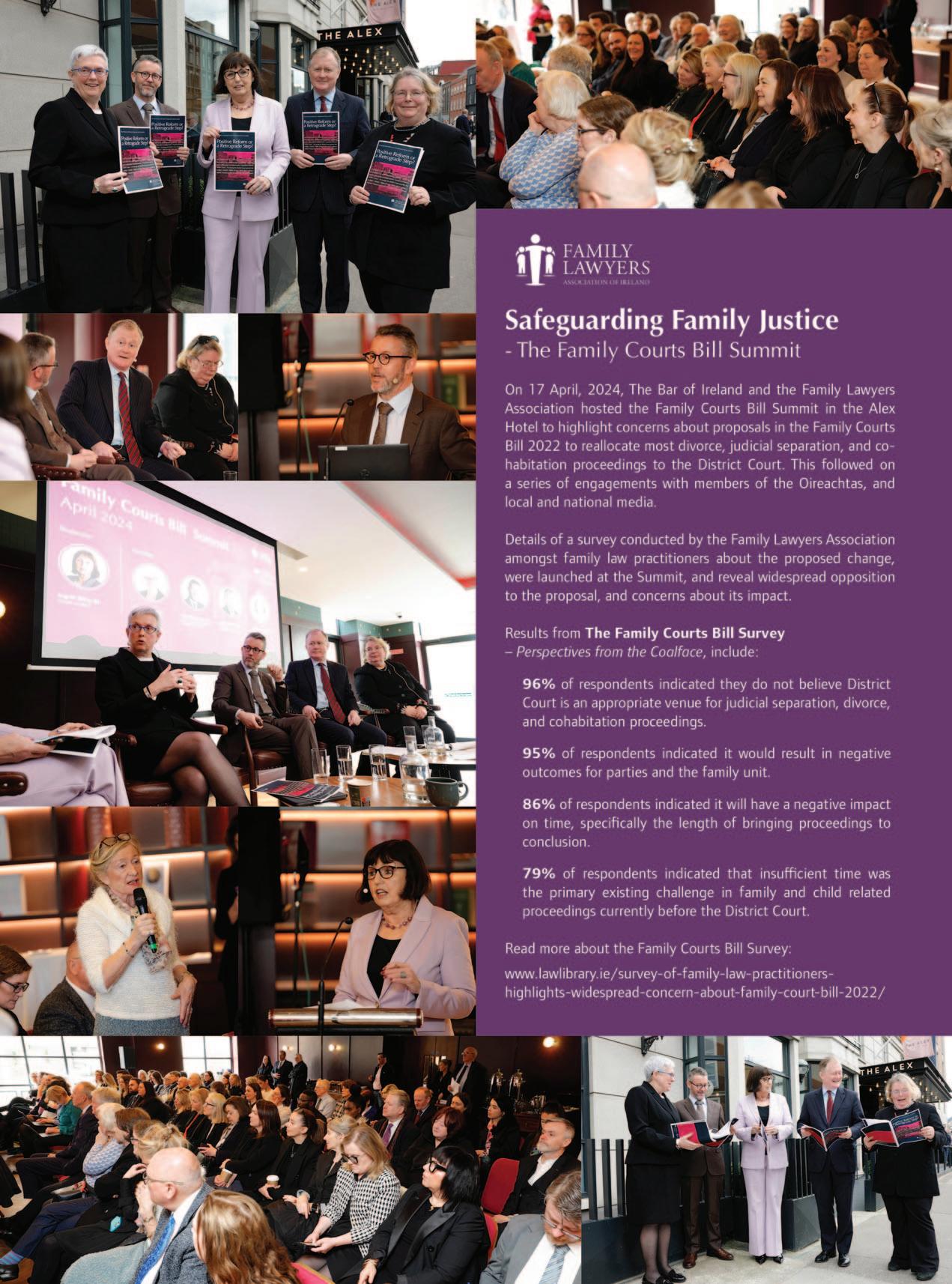
The Tort and Insurance Bar Association (TIBA) Annual Conference took place on April 27 at ATU Letterfrack in picturesque Connemara. Attendees heard three panel sessions throughout the day and finished with dinner in Renvyle House Hotel and an address from Rossa Fanning, Attorney General of Ireland.
The first panel was moderated by Ms Justice Mary Faherty, Judge of the Court of Appeal, and featured Ms Justice Marie Baker, Ms Justice Ailleen Donnelly and Eoin McCullough SC as speakers. Topics covered included Moorhouse vs Governor of Wheatfield Prison and ‘Nervous shock: Recent developments’.
The second session led with a presentation by Judge Helen Boyle on ‘Practical implementations of the PI Guidelines in the Circuit Court’, which was followed by a panel discussion with Sara Phelan SC, Chair, Council of The Bar of Ireland, and Tim O’Connor BL. This session was moderated by Ms Justice Mary Rose Gearty.
The final session covered a range of subjects
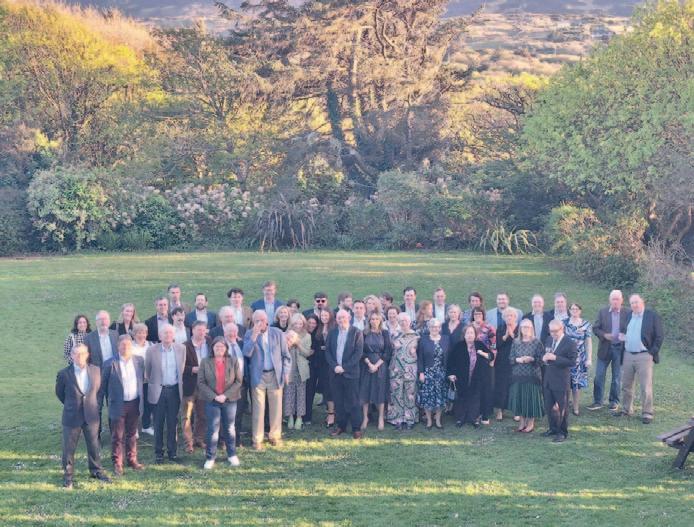
such as damages in the three years since the judicial guidelines, Covid-19 losses, expert evidence in Australia, and the liability of unincorporated associations. The presentations were made by Jeremy Maher SC, Martin Canny
The day provided plenty of learning and stimulating conversation on tort and Insurance.
 BL, Mark Tottenham BL, and Aran Grealish BL, and the discussion was moderated by Attorney General Rossa Fanning.
BL, Mark Tottenham BL, and Aran Grealish BL, and the discussion was moderated by Attorney General Rossa Fanning.

The Employment Bar Association (EBA) held an informative CPD on April 17, which dealt with probation periods. Brendan Kirwan SC, Chair of the EBA, chaired the discussion. The decision in Whelan v Minister for Transport (2023) IEHC 586 was discussed in depth. Speakers Elizabeth Ann Kirwan BL and Helen Callanan SC took the audience through the complexities of the case. There was plenty of discussion surrounding what constitutes a probationary period and what needs to be considered when dealing with different types of probationary periods depending on the workplace. This hybrid event was followed by a lively Q&A session.
The Sports Law Bar Association (SLBA) is proud to have hosted the first cross-border sports law event in the Inns of Court, Belfast, on April 26. In attendance were both the Attorney General for Northern Ireland, Dame Brenda King, and Attorney General of Ireland, Rossa Fanning. Olympians Elizabeth Colvin (OLY Irish Women’s Hockey) and Paddy Barnes (OLY Irish Boxing), alongside expert sports lawyer Conor Sally, shared experiences from their sporting careers and work in the area. The panel was moderated by Emma Davey BL, Secretary of the SLBA.
Panellists discussed the rules applicable during their sporting careers and the stronger protections in place today, ensuring fair procedures and natural justice for athletes at both grassroots and international level. The involvement of lawyers and the potential to over-legalise sports disputes was a topic of interesting debate. All participants agreed that athletes should be allowed legal representation in particularly complex disputes.

From left: Suzanne Murray SC; Denis Devane, Wind Energy Ireland; Gemma Hayes BL; Dr Eva Barrett, ISEA; and, Stephen Dodd SC, Chair of PELGBA.
The Planning, Environmental and Local Government Bar Association (PELGBA) hosted an event on May 3 titled ‘It’s Electrifying: Planning considerations in the renewable energy sector’. With Ireland’s aim to
have 80% of its electricity generated by renewable energy sources by 2030, this was certainly of huge importance. Opened by PELGBA Chair Stephen Dodd SC, the Association was delighted to have esteemed experts presenting on the day. Dr Eva Barrett of the Irish Solar Energy Association (ISEA) gave a great insight into the planning considerations necessary in the solar energy sector. Denis Devane from Wind Energy Ireland spoke on the challenges faced by those in the wind energy industry in Ireland. Suzanne Murray SC gave a legal take on the overall planning considerations within the renewable energy sector. This event had a huge turnout from internal and external stakeholders alike. Afterwards there was a unique opportunity for attendees to network with others within the industry.

Dame Brenda King, Attorney General of Northern Ireland; Olympian Paddy Barnes; Emma Davey BL; and, Aoife Farrelly BL.
The panel also shared concerns about the complex nature of rules and the evolving litigious nature of sport. This event was open to both
barristers and solicitors from the island of Ireland. The drinks reception afterwards offered a unique cross-border networking opportunity.
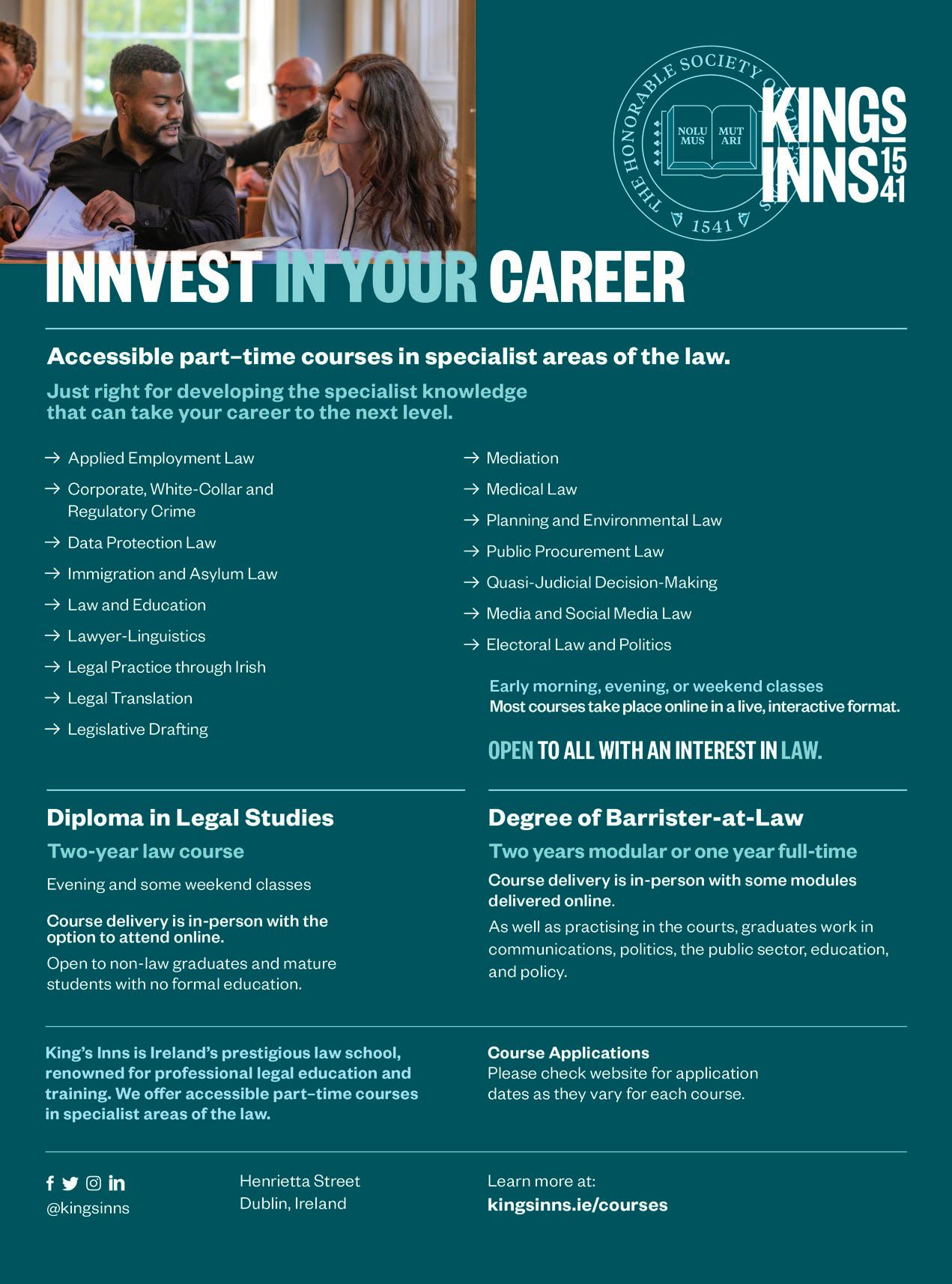
On April 16, Chair of the Criminal State Bar Committee Seán Guerin SC and Kate Egan BL appeared before the Joint Oireachtas Committee on Justice to provide comprehensive suggestions and feedback regarding the Proceeds of Crime (Amendment) Bill 2024.
The Bar of Ireland welcomed the opportunity to contribute to the in-person consultation process and re-emphasised the need for careful consideration of and potential amendments to the Bill in order to ensure alignment with legal principles and data protection standards.
Read the Bar’s submission on the General Scheme of the Bill at: https://www.lawlibrary.ie/app/uploads/securepd fs/2024/03/Submission-re-Proceeds-of-CrimeAmendment-Bill-2024-29.2.24-1.pdf
The Bar of Ireland v The Bar of Northern annual cricket match was held at the Hills Cricket Club on Sunday, May 12. The match ended in a draw and was abandoned due to heavy thunder and lightning storms with a further 10 overs remaining, preventing a very exciting finish.
Standing (from left): Charles Lysaght; Neale Matthews KC; Roland Budd; Gary Hayes; Martin Block; Kevin Roche; Marc Murphy; Anthony Kerr SC; Gavin Miller; Barry Valentine OBE; Joseph Aiken KC; Ian Skelt KC; Stuart Magee; Nick Compton; Jordan McClurkin; and, Andrew Beech. Kneeling (from left): Judge Dara Hayes; Keith Spencer; Conor Doyle; Diarmuid O’Leary; Simon Wilson; Jack Ryan; Andrew McKibbin; Ben Lowry; Jamie Matthews; and, Michael McCracken.
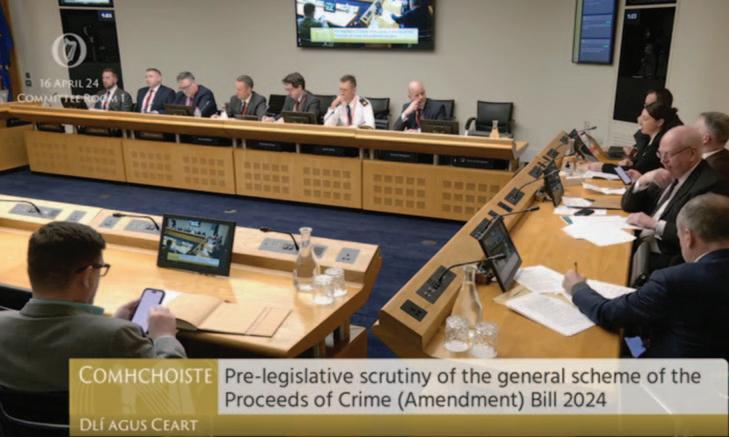
The Bar of Ireland presented to the Joint Oireachtas Committee on Justice regarding the Proceeds of Crime (Amendment) Bill 2024.


Meet your colleagues from 8.00am each day for quality food, top-notch coffee and great conversation! Open in Distillery Buildings, Jorge and his team also deliver fantastic fayre daily at the Barrister’s Tea Rooms (Four Courts) and Sky Café (Church Street).
¡Buen comida! ¡Buen provecho!



On March 21, members of The Bar of Ireland collaborated over coffee with JD, LLM and MSL students from Northwestern University Pritzker School of Law in Chicago as part of their International Team Project course. This comparative law course inspired conversation with Bar of Ireland colleagues on topics ranging from data privacy, international tax and digital banking, to defamation law and reproductive justice, and differences between the US and Ireland. In addition, students gained insight into the history of the barrister profession and the Irish legal system with a morning tour of the Four Courts.



Michelle Farrell
Fee Recovery Manager Ext: 5053 feerecovery@lawlibrary.ie

Waad Alias
Fee Recovery Administrator Ext: 5409 feerecovery@lawlibrary.ie
Minister for Justice Helen McEntee TD spoke to The Bar Review about proposed changes to the family courts system, the Domestic, Sexual and Gender Based Violence Agency, and the current status of proposed hate speech legislation.
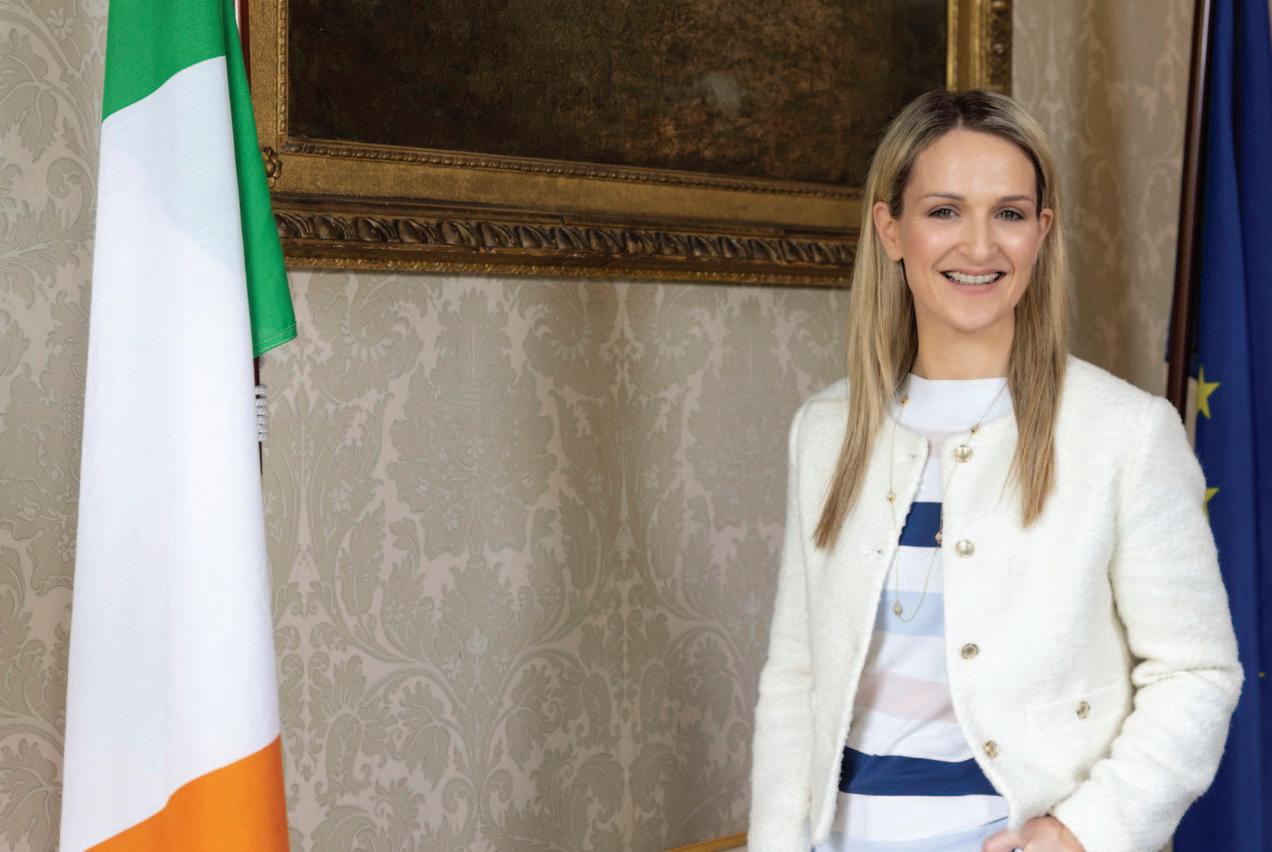


 Ann-Marie Hardiman, Managing Editor, Think Media
Ann-Marie Hardiman, Managing Editor, Think Media
Politics was always part of Minister Helen McEntee’s family life due to her father Shane’s involvement in Fine Gael in Co. Meath, but it wasn’t until she worked as his personal assistant in Dáil Éireann, both in opposition and in Government, that she began to see it as a potential career: “I saw the work that my dad was doing. I really loved the way that he worked. I love meeting people. I love the fact that no day is the same in politics, and that’s something that he loved as well. So I think I love it for all the same reasons that he loved it, and because I worked with him as well, it felt really natural to take that next step, even though it was a much bigger leap than I would have been thinking about”.
That leap was precipitated by her father’s sudden death in 2012. From considering a possible run in local elections, Minister
McEntee found herself standing in a by-election in Meath East to fill her late father’s seat. Since then, she has held junior ministerial positions, including as Minister of State for European Affairs, before her appointment in 2020 as Minister for Justice. All of this experience has given her a broad perspective on political life: “Working with my father, it was in opposition at the time, so you get a very different dynamic. And then [after the general election] he was working in a department, so I had that perspective. Becoming a TD, and then a minister, that’s a whole different experience. Every different layer, no matter what position you’re in, you’re coming at it from a different angle. But it has, I hope, benefited me because I’ve been able to see it from every single perspective. Somebody who’s in opposition: what is that like? How do you make sure that you’re listening to people and hearing their views? How do I make sure that I have a good working relationship with the people around me? I think it’s given me a really good allround picture of how politics works”.
One of the Minister’s priorities since her appointment has been addressing the issue of domestic, sexual, and gender-based violence. Following the adoption into law of the Domestic, Sexual and Gender-based Violence Agency Act 2023, the statutory agency, Cuan, was officially launched by the Minister in February of this year, with a wide remit that covers refuges and other services for victims of such violence, policy and research, and public education. Minister McEntee says that the agency is badly needed, as joinedup thinking and policy on this issue has been lacking in the past: “There hasn’t been a body with sole responsibility that’s a permanent fixture, so it’s an issue that’s come and gone. There’s been a lot of progress made, but at the same time, as priorities have changed,
as budgets have changed, it’s had an impact on the ability to respond to victims, but also to look at the bigger picture and to focus on prevention, strategy, and how we plan for the future. The Agency has been really important in creating that anchor”.
She says that one of the main purposes of the Agency is to co-ordinate a multiagency, multi-departmental approach: “It’s not just Justice, it’s not just Health, it’s Social Protection, it’s Housing, it’s Transport. It’s also the preventive side –communications, education, raising awareness – and then looking to the future, getting the facts so that our policies can be forward thinking as well”. Funding in the sector has increased, with a principal aim being to increase the number of refuges across the country: “We’ve gone from about ¤20 million for services to now just under ¤60 million, so obviously money is important to support the services on the ground. While the overall goal is zero tolerance, it’s not that we’re saying there’ll never be any domestic or sexual violence, so you need to make sure the services are funded and supported, and there for everyone who needs them”.
It’s also about using policy and public education to create culture change: “If the amount of violence and abuse that happens in homes was happening on our streets, there would be an outcry all day, every day. We’re tolerating it, and we shouldn’t. The Agency will be key to that, to keep driving home that message and holding us to task in Government”.
Minister McEntee acknowledges that changing the culture and focusing on prevention is a tall order, but says it starts with education, from primary school onwards: “Engaging with younger people is so important, but also acknowledging that young people are victims. Up until recently, much of our focus has been on the adult relationship, mainly women, obviously, but men also. There’s a real need to engage with young people at an early age. How do we talk about families or relationships, and what’s healthy and appropriate in a family setting? That’s not an easy thing to do, but we could ignore it, and you could have children in a really difficult scenario not knowing what’s going on, or we can try and do it in a way that protects children”.
The Family Courts Bill, which is currently making its way through the Oireachtas, is a key element of proposed and much-needed reform of the family justice system. However, The Bar of Ireland, along with other legal stakeholders, has raised serious concerns about aspects of the legislation, in particular the proposal to reassign jurisdiction in many family law cases from the Circuit to the District Court system. Barristers have argued that the District Court is already chronically under-resourced. Lengthy delays are commonplace, and facilities for litigants and their advocates are inadequate to meet current demand, let alone the much larger and more complex caseload that such changes would bring.
Minister McEntee agrees that more resources are needed for the proposed new system to work, and says they will be provided: “It will only work if we have the separate structures in place so that you have judges with a specialist interest in family law who are dealing only with family law. The number of judges is also key. We’ve appointed 24 of the judges initially recommended by the Judicial Planning Working Group, as well as eight High Court judges just in the last year and a half. The next tranche has recommended an extra 20 on top of that. I fully appreciate that if we were to suddenly take family law and put it in the District Court without extra judges and without separating it from all of the other pieces, that wouldn’t work. But that’s not what’s being proposed. You will have separate sittings, separate judges that are solely focused on family law”.
The reasoning behind the move, she says, is in keeping with the family justice strategy, and aims to take less complex and contentious family law issues out of the higher court: “The Family Courts Bill is part of my Family Justice Strategy, which sets out an extensive programme of family justice reform. Our family justice system needs to focus on the needs and rights of children, and to help their parents in making decisions that affect all of the family. The plan outlines the steps needed to create a more efficient and user-friendly family court system that puts the family and children at the centre of its work. This will take time; the Strategy contains over 50 actions across nine goals, with timelines for delivery up to the end of 2025. As the Strategy was developed, my Department listened to and acknowledged the many issues and concerns about how the current system operates. We are not operating in a vacuum; the Strategy has been informed by extensive stakeholder engagement and consultation”.
The higher courts will, she says, be available where they are needed: “It’s absolutely envisaged that you will still have a lot of cases that will need to be dealt with in the higher court jurisdictions, particularly in the Family Circuit Court division, once established. This is particularly so for contentious cases. There are, however, cases where most if not all of the issues have been agreed between the parties and what remains is the making of the appropriate order or the issuing of a decree by the Court. A dedicated Family District Court division should be well placed to deal with these cases. The aim is to keep as many people as possible in a situation where the issues can be dealt with and resolved quickly and with minimal cost”.
Barristers have also expressed concern that the move to the District Court will result in costlier cases and longer delays, with an increased likelihood of appeals to the High Court. It is also felt that this move will have a detrimental impact on the development of case law and legal precedent. Minister McEntee says, however, that all sections of the courts system will be available to those who need them: “I appreciate things can be appealed – they look straightforward and they’re not – but in dedicated family courts at all jurisdictional levels the judges will have the experience and specialist knowledge required to decide whether
the matters are more suited for determination by a different court jurisdiction. It’s not all about cost, but that’s an element of it. What we are aiming for is that cases will be determined in the Family Court division at the most appropriate jurisdiction, taking account of the matters that require the intervention of the Court. I welcome the ongoing engagement of the Bar with Departmental officials on the Family Courts Bill, and am sure that this collaborative approach will result in a Bill that meets the needs of families and children who have, regrettably, to avail of the services of the Family Courts, and is one which all stakeholders will have confidence in”.
She says there will also be a focus on mediation, better court facilities, and providing greater access to information about supports and services: “They will be key in terms of development of the actual physical infrastructure of the courts, and what other organisations may need to be there or which may need to be linked to, whether it’s domestic violence, supporting single parents, groups that are able to mediate, that they’re all part of the overall structure, information, advice and support that’s available”.
On a very positive note, the Minister welcomes the recent announcement that planning permission has been granted for the proposed new family courts building on Hammond Lane in Dublin, and says the project will go to tender later this year. Funding for the development has been ringfenced, and the hope is that this vital project will progress speedily.
Another priority for the Minister has been the Criminal Justice (Incitement to Violence or Hatred and Hate Offences) Bill 2022, frequently referred to as ‘hate speech’ legislation. This Bill too has been contentious, with recent calls for a review of its provisions from across the political spectrum. The Minister says that these concerns will be taken on board; however, she remains committed to the Bill: “I think you always have to try and address people’s concerns insofar as possible, but I think some of the concerns that have been raised are not valid, and there’s a lot of misinformation. There are suggestions that people wouldn’t be able to have opinions, to disagree with other people, to offend people, and that’s not what is proposed. In fact, there’s a defence in this Bill that doesn’t exist in the ’89 Act [the Prohibition of Incitement to Hatred Act 1989], which allows people to engage in debate or have opinions or views, whether it’s literary, artistic, political, or religious. It allows for free and open debate on many topics related to protected characteristics. In saying that, there’s never been a piece of legislation that I’ve enacted in this Department where I haven’t taken on board people’s concerns and either come back with amendments or looked at how we can address those concerns, so this won’t be any different”.
She says that the reasons why the new law is needed have not changed: “There are people in this country who are being assaulted, who are being attacked, whose property is being burnt down because of the colour of their skin, the
person that they love, where they’ve come from, what religion they are. These are crimes already being committed and they’re motivated by hatred. Are we going to say that that’s okay as a country? I really don’t think we do believe that that’s okay. I think it’s a really important piece of legislation, but I also acknowledge that there are concerns that it’s important to clarify”.
The Minister acknowledges that there is no specific timeline as to when these clarifications may be made, but says she does still intend to move on with the legislation as soon as possible.
Following a campaign by The Bar of Ireland, last year’s Budget contained a longawaited and much-needed 10% increase in the fees paid to barristers participating in the Criminal Legal Aid Scheme. While this increase was welcomed by the profession, it falls short of what is required to bring fees to pre-austerity levels, and serious problems remain in the criminal justice system, including issues with securing senior counsel for serious criminal cases. Reviews of both criminal and civil legal aid are ongoing, and the Minister awaits the results and says that she will seek to implement these, including any recommendations regarding fees: “While I couldn’t say what may or may not be in a budget, at the same time, the objective of the review was to see what, if any, further changes could or should be made. I was really glad that we were able to make the changes last year, and if further changes are required, then that’s something that I’ll be advocating for in the same way that I did last year”.

Helen McEntee is TD for the Meath East constituency. She graduated in economics, politics and law from Dublin City University, and holds a master’s in journalism and media communications from Griffith College Dublin. She began her political career in 2010, working as personal assistant to her father, Shane McEntee TD. Following her father’s death in 2012, she contested the byelection in the constituency and was elected to Dáil Éireann in 2013. She was subsequently re-elected in 2016, when she was appointed Minister of State with responsibility for Mental Health and Older People. In 2017, she was appointed Minister of State for European Affairs, a position she held until her appointment as Minister for Justice following the general election in 2020. Minister McEntee lives in Co. Meath with her husband and two children, and says that any spare time she has is spent with them, and catching up with friends: “I have a lot of great friends, who I don’t get to see as much as I’d like, so when I can, I like to catch up with them. And I love music, I love going to concerts, so I have a few in the diary for this summer”.









Ireland
and The Bar of Northern Ireland, looked at how the independent referral Bar can address the issues facing the legal system and society at large.

 Ann-Marie Hardiman, Managing Editor, Think Media
Ann-Marie Hardiman, Managing Editor, Think Media
Members of independent referral Bars from around the world came together in Belfast and Dublin from May 15-17 for the World Bar Conference. Delegates came from the Bars of Ireland, Northern Ireland, England and Wales, Scotland, Australia, New Zealand, Hong Kong and South Africa to hear a truly impressive array of panellists discuss issues from cancel culture, the rule of law in an age of conflict, and artificial intelligence (AI), to the climate crisis and migration.
The Conference began in Belfast with a welcome reception at The Bar of Northern Ireland, including an official welcome from Naomi Long MLA, Justice Minister at the Northern Ireland Executive.
The first full day took place in the beautiful Titanic Hotel where, following an official welcome from The Rt Hon. Dame Siobhan Keegan, Lady Chief Justice of Northern Ireland, Chair of The Bar of Northern Ireland Moira Smyth KC chaired the opening panel on ‘Navigating the Crossroads: Cancel Culture, Free Speech, and the Right to Offend’.
Keynote speakers the Hon. Mr Justice David Scoffield of the Northern Ireland High Court and Joanna Cherry KC MP gave their perspectives on the topic. Mr Justice Scoffield spoke of the value of free speech and freedom of expression in law and in society, as inherent aspects of human dignity, necessary to democracy and to the development of ideas. He asked whether, given the power of speech, it can ever be truly free, and what restrictions might be legitimate, particularly in instances of competing rights. He also spoke of the responsibilities and duties that free speech carries, which he said must be centred on values of pluralism and tolerance.
Joanna Cherry focused on her own experiences and those of others who hold gendercritical views. She said that case law reflects freedom of expression being underpinned by the freedom to offend, and that the law has been misapplied in cases concerning gender identity, where the law and principle of free speech have been ignored. In law, if gendercritical beliefs are expressed respectfully, they are lawful and worthy of respect in a democratic society. She spoke also of a “crisis” in universities and other institutions where ‘de-platforming’ of speakers and criticism of academics has led to the curtailment of academic freedom.
In the panel discussion that followed, the speakers were joined by Lord Keith Stewart of Dirleton KC, Advocate General for Scotland, and Rossa Fanning, Attorney General of

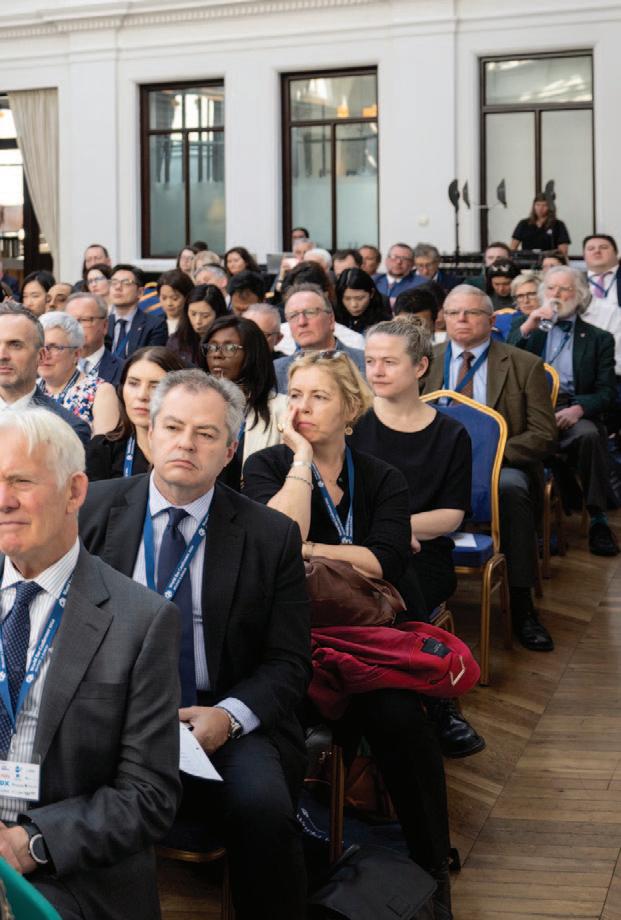
Ireland. The panel expanded on many of the ideas put forward in the two keynote addresses, with Lord Stewart stating that the suppression of ideas is a fundamental problem for society, and expressing concern at ‘cancel culture’, where “the process is the punishment”. Attorney General Rossa Fanning spoke of the Irish Constitutional position, and of how resolving what he called the “clash of entitlements” has been left largely to defamation law, which struggles to offer an effective remedy in a world where a defamatory comment can be restated thousands of times online in a matter of minutes. The panel felt that this is a major challenge for common law jurisdictions in a world of hyperpolarisation of views, amplified by social media, and that the solution might be to refocus on the fundamentals of tolerance, pluralism and broadmindedness, and raise and maintain standards of discourse (with education, media, politics and the courts all having a role to play).
The next panel was entitled ‘Rule of law under fire: Existing in an Age of Conflict’. Chair Peter Coll KC of The Bar of Northern Ireland introduced three keynote speakers: Prof. Fionnuala Ní Aoláin KC Hon. of Queen’s University Belfast; the Rt Hon. Victoria Prentis KC MP, Attorney General for England and Wales; and, Yurii Bielousov, Head of Department for Combatting Crimes Committed in Conditions of Armed Conflict, Office of the Prosecutor General of Ukraine.
Prof. Ní Aoláin said that deficits in human rights and the rule of law are often what precipitates conflict, a situation that is exacerbated during conflict, when the rule of law is inevitably undermined. While acknowledging that there can be no ‘quick fix’, she offered a roadmap for restoration of the rule of law post conflict. This begins with an often painful analysis of what the conflict has done to law, bearing in mind that a return to the status quo ante may not be desirable, and that reform may need to be built into the process. Peace processes are slow, she said, and the win is not at the end, but is rather in the continuity. She also spoke of the need to be creative in how justice is administered post conflict, incorporating truth recovery, guarantees of nonrepetition, memorialisation, and reparation, while also cognisant of the fact that there must be consequences for serious wrongs.
Attorney General Prentis spoke about definitions of the rule of law, and of her own role in upholding it in Government. She spoke of work in Ukraine to ensure that the quality of justice is not compromised, even in the unprecedented circumstances whereby investigations are taking place during an active conflict. She also spoke of the situation in Gaza, saying that it is essential to ensure that international justice is not used as a proxy for geopolitical issues.
Yurii Bielousov spoke of the extraordinary work being done by the Office of the Prosecutor General in Ukraine. Some 128,000 war crimes have been lodged with his office thus far, including the abduction of children, rape and sexual violence, torture, and illegal detention. He spoke of the challenges of prosecution while also respecting the human rights of the accused, but said that they are committed to respect for human rights, and to maintaining the highest standards in conducting investigations, arrests and prosecutions. He also spoke of the impact of this process on Ukrainian law, which has included a new focus on the rights of and support for victims, and also support for prosecutors and investigators in such an extraordinarily difficult situation.
For the panel discussion, the speakers were joined by Peter Dunning KC, President of the Australian Bar Association, and Roddy Dunlop KC, Dean of the Faculty of Advocates in Scotland. The discussion centred around the importance of protecting and upholding the rule of law domestically if we are to defend it internationally.
The final session of the day was titled ‘AI unleashed: Tomorrow’s Legal Landscape and the New Normal?’, and chaired by Donal Lunny KC, Bar of Northern Ireland. The keynote speakers were: Uwais Iqbal, Founder, Simplexico; Emma Wright, technology and data lawyer, and Partner at Harbottle & Lewis; and, Dr Michael Katell, Ethics Fellow at the Alan Turing Institute.
Uwais Iqbal described AI as a technique that attempts to use a machine to replicate the problem-solving and decision-making capabilities of the human
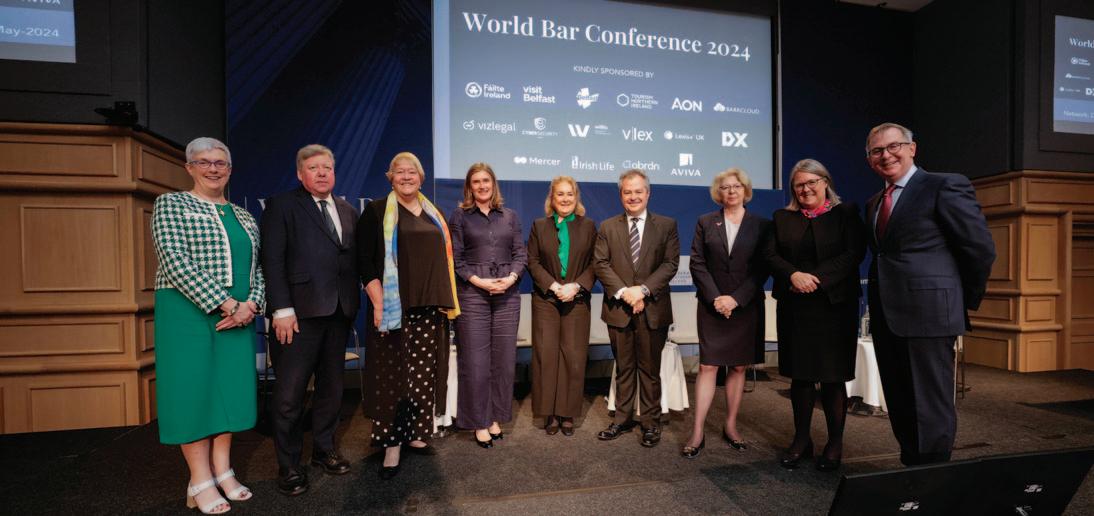
mind. This leads to questions as to what particular task/expertise we are trying to mimic, and how we might benefit from scaling that expertise in different ways. For the legal community, current uses of AI include the ability to extract, compare, organise or transcribe key information. The legal space is a very specialised one, so given that AI is here and we can’t ignore it, the task is to figure out what questions we need ask to make it work for the profession.
Emma Wright said that the legal sector, and society at large, needs to talk about risks and regulation, and needs more transparency and certainty, before fully adopting AI. She questioned whether legal professionals might be found wanting if they are not using AI to better serve their clients, but also raised issues around the risk of factual inaccuracy, and of discrimination potentially caused by the AI algorithm’s use of data. She discussed the new EU AI Act, among other legislation and guidelines, and how the global community is seeking to regulate this space.
Michael Katell said that technology could be an amazing tool to achieve access to justice, but can also be a barrier, or even a source of injustice. AI doesn’t exist, he said. It’s a conceptual model, a marketing tool, so the truism of ‘buyer beware’ certainly applies. There are lots of ways to implement AI, involving lots of human decisions, and therefore ethical issues. Some of these include sustainability (the resources required), workers’ rights, and exploitation of the global south, and he also raised the issue of accountability, saying the legal
profession has a role to play in the question of who is accountable if AI causes harm. Data justice should matter to all of us, he said – we all need to become active and activist.
For the panel discussion, Victor Dawes SC of the Hong Kong Bar Association and Felix Geiringer of the New Zealand Bar Association added their views on whether AI is a threat to the independent referral Bar. Views varied, with some speakers feeling that it could be a threat to junior barristers more than to senior, as it takes over work such as summarising judgments. For others, the threat is in its unverifiability, and the risk that algorithms perpetuate all of the biases of our past lives. AI is now part of the profession, so how do we train the next generation to use it effectively?
For the second day of the conference, proceedings moved to Dublin Castle, where the session was opened by an official welcome from Mr Justice Donal O’Donnell, Chief Justice of Ireland.
The first panel of the day was titled ‘Law in the Era of Climate Crisis: Unearthing the Legal Challenges’, and was chaired by Sara Phelan SC, Chair, Council of The Bar of Ireland. The keynote speakers were Catherine Higham of the Grantham Research Institute on Climate Change & the Environment, and Sarah Mead, Co-Director of the Climate Litigation Network.
Catherine Higham described the huge rise in climate change litigation globally, with courts taking an increasing role in holding governments/legislators to account in increasingly diverse cases. Cases against companies are also increasing, challenging both policies and their implementation. She said that climate change law is ‘hot law’, law that is constantly changing, requiring lawyers to be aware of the issues, and to be ‘climate conscious’ in all areas of their practice, not just in climate law.
Sarah Mead drew some conclusions from the rising number of cases against governments. She pointed out that climate change cases draw on wellestablished legal principles, and existing legal obligations apply. Case law has also proven that the global nature of climate change does not preclude individual or state responsibility. The scientific facts are very rarely in dispute, and provide a set of legal and scientific standards against which courts can assess each case. Time is running out, she said, and while the recent KlimaSeniorinnen v Switzerland judgment is likely to have implications for many other pending cases, this is a very fast-moving space.
The panel also included Dr Andrew Butler KC of the New Zealand Bar Association, Samuel Townend KC, Chair of the Bar Council of England & Wales, and Andrea Gabriel SC of the Society of Advocates of KwaZulu Natal, South Africa. Discussion centred around the role of the independent referral Bar, and the judiciary, in holding governments to account, but while also maintaining separation of powers, and avoiding the perception of judicial overreach. Some panellists saw a potential conflict in terms of the principle that the law also has a role in protecting the individual from the over-reach of State powers. The declaration of conscience signed by a number of UK lawyers, whereby they stated that they will not prosecute peaceful climate protesters or act for companies pursuing fossil fuel projects, was also discussed. The consensus was that the cab rank rule is crucial to the administration of justice, and must also apply in climate cases, although some panellists also pointed out that the declaration had a value in sparking debate about both climate and legal issues.
Sara Moorhead SC was chair for the next panel of the day, which discussed the extremely topical subject of ‘Humanity on the Move: Legal Frontiers in Migration and Human Rights’, with keynote speakers Gillian Triggs, Assistant High Commissioner for Protection, UNHCR, The Rt Hon. Lord Ben Stephens, Supreme Court of the United Kingdom, and Caoilfhionn Gallagher KC. Gillian Triggs spoke on the complexities of providing a humanitarian response in times of instability and conflict, where millions of people are on the move. She spoke of the role of lawyers in the protection of the vulnerable at a time when there has been what she called a worrying decline in the commitment of governments to human rights law. As governments begin to argue that the
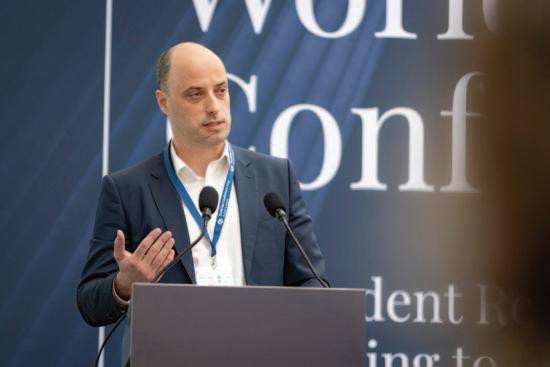
1951 Refugee Convention is no longer fit for purpose, lawyers have a crucial role in thinking creatively to find solutions that keep humanitarianism as their primary focus.
Lord Stephens echoed concerns about a need to balance the right of states to control their borders with the rights of individual migrants, and focused his presentation on the issue of migrant children. Children are dramatically overrepresented among refugees, and he said that further efforts must be made to make interpretation of the Refugee Convention and relevant legal structures more child centric, for example, in how the threshold of ‘persecution’ might be interpreted in the case of a child. He said that the UN Convention on the Rights of the Child has been a huge development that can hopefully become a common thread in decisions, providing a “principled, analytic framework”.
Caoilfhionn Gallagher KC spoke on the subject of transnational repression, where states act beyond their own borders to target political dissidents and activists, including journalists and lawyers. These attacks can range from online threats and coercion by proxy (targeting of a person’s family members still resident in the state), to direct attacks and even murder. Russia, Iran and China have all increased their activity in this area in recent years, but she also cited other countries such as Turkey. She offered a range of potential actions to address this threat, including international collaboration and sharing of information, good security hygiene (particularly for lawyers representing those targeted), country-specific strategies against aggressor states, and also tackling those who enable these tactics, for example by selling predator spyware.
The panel was joined by Aidan Sands KC of The Bar of Northern Ireland, and discussion centred on concerns in relation to the new EU Pact on Migration and Asylum and its possible impact, and also on reform of international conventions. The consensus was that reform in the current political climate
might lead to a rowing back of rights, rather than their development, and that developing transnational agreements might better meet the needs of displaced persons.
A truly eminent panel formed the final session of the day, on ‘An Independent Bar and an Independent Judiciary: Perspectives from Judges in ICAB Jurisdictions’. Mr Justice David Barniville, President of the High Court of Ireland, welcomed seven judges to the stage, including an online contribution from The Hon. Mr Justice Raymond Zondo, Chief Justice of the Republic of South Africa, asking each judge to speak on a key challenge to judicial and legal independence.
The Hon. Ms Justice Elizabeth Dunne of the Irish Supreme Court chose ‘access to justice’ as her broad theme, focusing on the development of civil legal aid in Ireland through the foundation of the Free Legal Aid Centres (FLAC) and later the State civil legal aid scheme. She commended the barristers and solicitors who set up FLAC and who continue to volunteer their services: there is no access to justice without support for those who cannot afford it, she said, and an independent Bar is crucial to this.
Chief Justice Zondo spoke of what he called the “threat” of ‘cadre deployment’ to the independent Bar in South Africa, whereby the ruling African National Congress (ANC) party maintained lists of party supporters for preferential appointment to important roles in the public sector.
A Commission chaired by then Deputy Chief Justice Zondo discovered that judges’ names were on those lists (although there was no evidence that the judges were aware of this). In South Africa, he said, the private sector/economy is still mainly white, and black lawyers depend on the Government for work, so these practices are a serious threat to independence.
The Hon. Justice Mark Livesey, President, Court of Appeal of South Australia, identified a need for better awareness in society of the vital role carried out by the independent Bar and independent judiciary, saying that the legal professions have a responsibility to educate the public. He also spoke of lack of resourcing of the courts services as a serious issue, citing long-term underinvestment in his own region of South Australia. He said that the Bar and the Bench must work together to improve efficiencies and educate the public, and that the Bar can and should raise issues where the Bench cannot.
The Rt Hon. the Baroness Sue Carr, Lady Chief Justice of England & Wales, echoed this sentiment, saying that safeguarding independence requires better public understanding of the roles of lawyers and judges, as well as improved dialogue with and transparency towards civil society. She highlighted in particular the need for better understanding of the cab rank rule.
The Hon. Dame Susan Glazebrook of the Supreme Court of New Zealand/Te
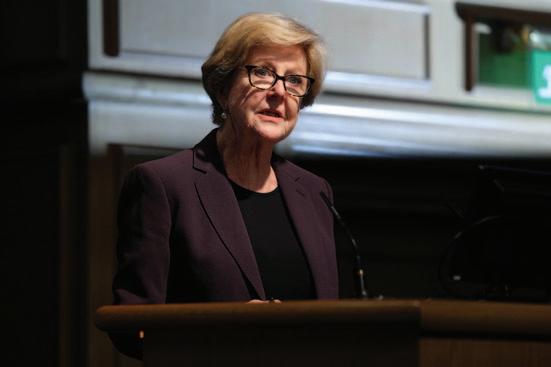
Koti Mana Nui returned to the theme of access to justice, speaking of delays in the legal system and underfunding of legal aid in her jurisdiction as just two of the factors that impact on justice for both accused persons and victims. She also spoke of what she called a “weakening of faith in institutions, including courts”, and again reiterated the important role of the Bar in public education.
The Rt Hon. Lord Carloway, Lord President of the Court of Session and Lord Justice General of Scotland, spoke about recent attempts in Scotland to change the regulatory and disciplinary structures under which judges and advocates operate, via the Regulation of Legal Services (Scotland) Bill, which had the potential to compromise the separation of powers. He said that to protect independence, regulatory bodies must pre-empt criticism by politicians of self-regulation by the professions by having robust, fair and transparent processes.
Finally, the Rt Hon Dame Siobhan Keegan, Lady Chief Justice of Northern Ireland, spoke once again about how the Bar and the Bench rely on each other, about the challenges of modernising effectively in a climate of underfunding, and also whether all modernisation is good (for example, whether informalising the family court has led to greater security issues). In Northern Ireland, they are considering a range of options, from televising decisions, to different courts for different areas (e.g., substance misuse courts, domestic violence courts). She cautioned against losing sight of the power of oral advocacy, which she said is a big part of independence.
The Conference session was brought formally to a close by Sara Phelan SC, Chair, Council of The Bar of Ireland, who thanked attendees and panellists for their contributions, and the staff of the Bars of Northern Ireland and Ireland for their hard work in organising this fantastic event.


A directory of legislation, articles and acquisitions received in the Law Library from March 8, 2024, to May 2, 2024
Judgment information supplied by Vlex Justis Ltd.
Edited by Vanessa Curley, Susan Downes and Clare O’Dwyer, Law Library, Four Courts.
Articles
Dooley, A.-M., Ryan, P.J., Dr. Perjury: from national sport to a statutory deterrence model. Irish Law Times 2024; 42(5): 51-55
Articles
Stitt, J., Matthews, J. Revision of the Arbitration Act 1996: the case for arbitral independence. Hibernian Law Journal 2023; 22: 43-73
Contract – Negligence – Defamation – Appellant seeking to dismiss or strike out the claims made by the respondent against the appellant –Whether the appellant should be permitted to rely on substantial arguments that were not considered by the High Court – 06/03/2024 –[2024] IECA 51 Fannon v Ulster Bank Ireland DAC and others
Articles
McCarthy, J., Dr. The prospect of a digital Euro: incentives, design, and legal effects. Commercial Law Practitioner 2022; 29 (7): 135-142
Statutory instruments European Union (Bank Recovery and Resolution) (Amendment) Regulations 2024 – SI 139/2024
Central Bank (Supervision and Enforcement) Act 2013 (Section 48(1) (Senior Executive Accountability Regime) Regulations 2024 – SI 147/2024
Statutory instruments
Broadcasting Act 2009 (Section 21) Levy Order 2024 – SI 175/2024
Articles
Butler, K. The Construction Contracts Act (2013): a review after ten years. Construction, Engineering and Energy Law Journal 2024; 1: 5-32
Dunne, C. Building Regulations, control compliance and judicial review. The Bar Review 2024; 29 (2): 67-71
Statutory instruments
Building Regulations (Part B Amendment) Regulations 2024 – SI 108/2024
Articles
McEnroy, F. A hidden jurisdiction trap. The Bar Review 2022; 27 (2): 51-54
Special care orders – Welfare of the child – Child Care Act 1991 –Appellant appealing against special care orders – Whether the appellant was justified in not making an application for a special care order under s.23F of the Child Care Act 1991 – 26/02/2024 – [2024] IESC 6 McD (a child), In re
Statutory instruments
Mother and Baby Institutions Payment Scheme Act 2023 (Reviews) Regulations 2024 – SI 87/2024
Mother and Baby Institutions Payment Scheme Act 2023 (Financial support in respect of legal costs and expenses) Regulations 2024 – SI 88/2024
Mother and Baby Institutions Payment Scheme Act 2023 (Appeals) Regulations 2024 – SI 89/2024
Articles
Hardiman, A.-M. Speaking for children. The Bar Review 2022; 27 (2): 40-42
Quill, W. Child Care (Amendment) Act 2022: providing for the voice of the child in public law proceedings. Irish Journal of Family Law 2022; 25 (3): 54-57
Smith, G. The enforcement of child maintenance. Irish Journal of Family Law 2024; 27 (1): 1-2
Statutory instruments Civil Law (Miscellaneous Provisions) Act 2022 (Section 4(2)) (Scheme Termination Date) Order 2024 – SI 94/2024
Articles
Little, C. Hear my train a comin’. Law Society Gazette 2024; Apr: 54-58
Statutory instruments Wireless Telegraphy (Satellite Earth Station Licence) Regulations 2024 –SI 96/2024
COMPANY LAW
Articles
Heery, L. Piercing the corporate veil: Powers v Greymountain Management Ltd (in liquidation) and others [2022] IEHC 599. Hibernian Law Journal 2023; 22: 154-162
Articles
Casey, A. GDPR, Article 102 TFEU and the Digital Markets Act – assessing the implications of the preliminary reference in Meta Platforms v Bundeskartellamt for ‘big tech’ data processing. Irish Law Times 2024; 42 (6): 67-72
Doherty, B. Are we there yet? Administrative financial sanctions under the Competition (Amendment) Act 2022. Irish Journal of European Law 2023; 25: 23-62
Dunne, E. Alignment or divergence? An analysis of UK and EU competition law post-Brexit with a particular focus on merger control. Hibernian Law Journal 2023; 22: 96-125
Lang, J.T. The duty of cooperation of national courts in EU competition law. Irish Journal of European Law 2023; 25: 189-215
O’Donoghue, R. Sincere cooperation in EU competition law: the culmination of John Temple Lang’s vision? Irish Journal of European Law 2023; 25: 157-187
Library acquisitions
Honey, R., Pereira, J., Daly, C., Clutten, R. The Law of Compulsory Purchase (4th ed.). United Kingdom: Bloomsbury Professional, 2022 – N96
Articles
White, F. B2C contracts for the supply of services: a new approach. Commercial Law Practitioner 2022; 29 (7): 127-133
Articles
McMahon, A., Prof. Patently obvious.
Law Society Gazette 2024; Apr: 2731
Newman, J. The EU Unified Patent Court referendum. The Bar Review 2024; 29 (2): 72
Statutory instruments
District Court Districts and Areas (Amendment) and Variation of Days and Hours (Gorey) Order, 2024 – SI 97/2024
Circuit Court Rules (Order 36) 2024 – SI 107/2024
District Court Districts and Areas (Amendment) and Variation of Days for the District Court Area of Tuam Order, 2024 – SI 111/2024
District Court Districts and Areas (Amendment) and Variation of Days for the District Court Area of Longford Order, 2024 – SI 112/2024
District Court Districts and Areas (Amendment) and Variation of Days for the District Court Area of Cork City Order, 2024 – SI 113/2024
District Court Districts and Areas (Amendment) and Variation of Days and Hours (Drogheda and Dundalk) (No. 3) Order, 2024 – SI 138/2024
District Court Districts and Areas (Amendment) and Variation of Days and Hours (Drogheda and Dundalk) (No. 4) Order, 2024 – SI 148/2024
District Court Districts and Areas (Amendment) and Variation of Days and Hours (Nenagh, Thurles) No. 3. Order, 2024 – SI 149/2024
District Court Districts and Areas (Amendment) and Variation of Days and Hours (Nenagh, Thurles) No. 4. Order, 2024 – SI 150/2024
Rules of the Superior Courts (Order 61) 2024 – SI 161/2024
Rules of the Superior Courts (Order 84) 2024 – SI 163/2024
Statutory instruments
Credit Union Act 1997 (Section 38) Order 2024 – SI 137/2024
Library acquisitions
Law Reform Commission. Law Reform Commission issues paper no. 67 –compensating victims of crime Dublin: Law Reform Commission, 2022 – L160.C5
Walsh, K., Dixon, S. Domestic Violence: Law and Practice in Ireland
Dublin: Bloomsbury Professional, 2024 – N175.C5
Articles
Coughlan, B. The castle is where the heart is: an examination of the castle doctrine and the justifiable use of force in the defence of the dwelling. Irish Criminal Law Journal 2024; 34 (1): 3-14
Hamilton, C. Replacing the Offences Against the State Acts: shaking the security mindset. Irish Criminal Law Journal 2024; 34 (1): 15-18
Holmes, M. Contempt of court. Irish Criminal Law Journal 2022; 32 (3): 88-95
Walsh, A. Reform of victim testimony in sexual offence trials. Irish Criminal Law Journal 2022; 32 (3): 74-87
Acts
Criminal Justice (Engagement of Children in Criminal Activity) Act 2024 – Act 8/2024 – Signed on March 11, 2024
Statutory instruments
Student Grant Scheme 2024 – SI 103/2024
Student Support Regulations 2024 –SI 104/2024
Higher Education Authority Act 2022 (Appeals) Regulations 2024 – SI 132/2024
Statutory instruments
European Parliament Elections (Amendment) Regulations 2024 – SI 98/2024
Electoral Act 1997 (Section 3) Order 2024 – SI 133/2024
Local Elections (Disclosure of Donations and Expenditure) Act
1999 (Variation of Monetary Amounts) Order 2024 – SI 134/2024
Local Elections (Disclosure of Donations and Expenditure) Act
1999 (Period for Reckoning Election Expenses) Order 2024 – SI 135/2024
Electoral Act 1997 (Section 102) Order 2024 – SI 136/2024
Electoral (Amendment) Regulations 2024 – SI 142/2024
Statutory instruments
Work Life Balance and Miscellaneous Provisions Act 2023 (Commencement)
Order 2024 – SI 90/2024
Work Life Balance and Miscellaneous Provisions Act 2023 (Commencement) (No. 2) Order 2024 – SI 91/2024
Work Life Balance and Miscellaneous Provisions Act 2023 (Workplace Relations Commission Code of Practice on the Right to Request Flexible Working and the Right to Request Remote Working) Order 2024 – SI 92/2024
Safety, Health and Welfare at Work (Carcinogens, Mutagens and Reprotoxic Substances) Regulations 2024 – SI 122/2024
Statutory instruments
Energy (Windfall Gains in the Energy Sector) (Cap on Market Revenues) Act 2023 (Returns) Regulations 2024 – SI 86/2024
Sustainable Energy Act 2002 (Section 8(2)) (Conferral of Additional Functions – Reporting of National Energy Statistics and Electricity and Natural Gas Prices) Regulations 2024 – SI 151/2024
Articles
Mitchell, A. Law in transition: an examination of transgender equality rights in the European Union. Irish Journal of European Law 2022; 24: 25-52
Library acquisitions Bogdanowicz, P. Contract Modifications in EU Procurement Law . Cheltenham, England; Northampton, Massachusetts: Edward Elgar Publishing, 2021 –W109.6
Articles
Benedi Lahuerta, S. EU transparency legislation to address gender pay inequity: what is on the horizon and its likely impact in Ireland. Irish Journal of European Law 2022; 24: 161-187
Collins, A. ‘Locus Standi of Private Parties under Article 173(4)’: a reflection. Irish Journal of European Law 2022; 24: 253-262
Engel, A. The limits of intergovernmental flexibility in EU law: evidence from the Irish opt-out in the area of freedom, security and
justice and the new surrender mechanism with the UK. Irish Journal of European Law 2022; 24: 105-118
Gallagher, S., Müller, A. Standing still or jumping the gun: lessons from the Altice judgment. Irish Journal of European Law 2022; 24: 215-238
Hardiman, D. The application of public procurement law to development agreements. Irish Journal of European Law 2022; 24: 137-160
Kingston, S. A fond embrace? 50 Years of EU law before the Irish courts. Irish Journal of European Law 2023; 25: 1-22
Kirst, N., Monciunskaite, B. Establishing a link between solidarity and responsibility – the court’s judgment on the Conditionality Regulation. Irish Journal of European Law 2022; 24: 203-214
Rainey, R. K 3/21 – a direct attack on the foundation of the European Union. Irish Journal of European Law 2022; 24: 189-202
Acts
European Arrest Warrant (Amendment) Act 2024 – Act 9/2024– Signed on March 12, 2024
Statutory instruments
European Union (Restrictive Measures concerning Ukraine) (No.4) Regulations 2024 – SI 105/2024
European Union (Official Controls in relation to Food Legislation) (Amendment) (No. 2) Regulations 2024 – SI 106/2024
European Union (Restrictive Measures concerning Somalia) Regulations 2024 – SI 115/2024
European Union (Contestable and Fair Markets in the Digital Sector) Regulations 2024 – SI 117/2024
European Communities (Reception Conditions) (Amendment) Regulations 2024 – SI 118/2024
European Union (Restrictive Measures concerning ISIL (Da’esh) and Al-Qaeda and natural and legal persons, entities or bodies associated with them) (No. 2) Regulations 2024 – SI 127/2024
European Union (International Labour Organisation Work in Fishing Convention) (Safe Manning) (Amendment) Regulations 2024 – SI 156/2024
European Union (Novel Foods) (Amendment) Regulations 2024 – SI 159/2024
European Union (Restrictive Measures concerning the Democratic People’s Republic of Korea) Regulations 2024 – SI 169/2024
European Union (Restrictive Measures concerning Central African Republic) Regulations 2024 – SI 170/2024
European Union (Restrictive Measures concerning the Democratic Republic of the Congo) Regulations 2024 – SI 171/2024
European Union (Restrictive Measures concerning Syria) Regulations 2024 – SI 172/2024
European Union (Restrictive Measures concerning Syria) Regulations 2024 – SI 173/2024
European Union (Payment Services) (Amendment) Regulations 2024 – SI 174/2024
European arrest warrant – Surrender – European Arrest Warrant Act 2003 s.44 – Appellant contesting his surrender to Romania – Whether the appellant’s surrender was precluded – 10/04/2024 – [2024] IESC 12 Crofton Buildings and another v An Bord Pleanála
Enforcement order – Access – Family therapy – Appellant seeking an enforcement order in respect of an order providing for access by the appellant to the parties’ eldest child – Whether the respondent was responsible for the breakdown of contact between the parties’ eldest child and the appellant –21/03/2024 – [2024] IECA 63 K.P. v L.P.
Articles
Bracken, L., Dr. The position of the surrogate in the Health (Assisted Human Reproduction) Bill 2022. Irish Journal of Family Law 2022; 25 (3): 45-53
McGloughlin, F. Sections 32 and 47 reports: is there a time for a judge to speak with a child? Irish Law Times 2024; 42 (5): 56-60
O’Connell, C., Dr. The mother in Irish law. Irish Journal of Family Law 2024; 27 (1): 8-15 [part 1].
O’Sullivan, K., Dr. The “dejudicialisation” of family law in Europe: where does Ireland stand?
Irish Journal of Family Law 2024; 27 (1): 3-7
Phelan, S., Browne, D. Retrograde or real reform? The Bar Review 2024; 29 (2): 51-53
Walsh, K. District Court disaster. Law Society Gazette 2024; Apr: 20-21
Articles
Guildea, B. Access to funds? The Bar Review 2022; 27 (3): 69-72
Hardiman, D., Smyth, M. A new regime for FDI screening. The Bar Review 2024; 29 (2): 62-66
Lynch Shally, K. The European Union representative redress action in Irish financial services: convergence or differentiation and potential clarification? Irish Journal of European Law 2022; 24: 53-103
Statutory instruments
Financial Services and Pensions Ombudsman Act 2017 [Financial Services and Pensions Ombudsman Council] Financial Services Industry Levy Regulations 2024 – SI 99/2024 Finance Act 2022 (Section 46(1)) (Commencement) Order 2024 – SI 101/2024
Statutory instruments
Infrastructure for Spatial Information in the European Community (INSPIRE) (Transfer of Departmental Administration and Ministerial Functions) Order 2024 – SI 109/2024
Appointment of Special Advisor (Minister of State at the Department of Justice) Order 2024 – SI 128/2024
Appointment of Special Advisor (Minister for Justice) Order 2024 – SI 129/2024
Appointment of Special Adviser (Tánaiste, Minister for Foreign Affairs and Minister for Defence) Order 2024 – SI 157/2024
Appointment of Special Adviser (Leader, Minister for the Environment, Climate and Communications and Minister for Transport) Order 2024 – SI 158/2024
Statistics (Delegation of Ministerial Functions) Order 2024 – SI 160/2024
Appointment of Special Adviser (Minister of State at the Department of Public Expenditure, National
Development Plan Delivery and Reform and the Department of Tourism, Culture, Arts, Gaeltacht, Sport and Media) Order 2024 – SI 164/2024
Enterprise, Trade and Employment (Delegation of Ministerial Functions) Order 2024 – SI 165/2024
Enterprise, Trade and Employment (Delegation of Ministerial Functions) (No. 2) Order 2024 – SI 166/2024
Finance (Delegation of Ministerial Functions) Order 2024 – SI 167/2024
Statutory instruments
Infectious Diseases (Amendment) Regulations 2024 – SI 119/2024
Public Health (Tobacco Products and Nicotine Inhaling Products) Act 2023 (Commencement) Order 2024 – SI 121/2024
Medicinal Products (Prescription and Control of Supply) (Amendment) (No. 3) Regulations 2024 – SI 162/2024
Statutory instruments
European Union Habitats (Kenmare River Special Area of Conservation 002158) Regulations 2024 – SI 143/2024
European Union Habitats (Kilkieran Bay and Islands Special Area of Conservation 002111) Regulations 2024 – SI 144/2024
European Union Habitats (Lough Coy Special Area of Conservation 002117) Regulations 2024 – SI 145/2024
European Union Habitats (Lough Bane and Lough Glass Special Area of Conservation 002120) Regulations 2024 – SI 146/2024
Articles
Becker, H. The UNHCR and the enforcement of refugee protection before international courts: amicus curiae interventions before the ECtHR. Irish Journal of European Law 2022; 24: 119-135
O’Neill, K. The pursuit of online regulation at the price of Article 10 corrosion: a case note on Sanchez v France (2 September 2021), Fifth Section ECtHR. Hibernian Law Journal 2023; 22: 163-174
Library acquisitions
Lambert, P., Gringras, C. Gringras: The Laws of the Internet (6th ed.) Haywards Heath: Bloomsbury Professional, 2022. eBook edition available on Bloomsbury Professional through Barrister’s Desktop – N347
Articles
Conlon, A. Spring after the crypto winter? The markets in crypto-assets regulation and the collapse of FTX. Irish Journal of European Law 2023; 25: 85-106
MacMahon, M. The EU’s Digital Services Act: an analysis of the updated conditional intermediary liability regime. Irish Journal of European Law 2023; 25: 107-132
Mahon, A. An analysis of Article 8 GDPR and the level of protection provided to children engaging in digital service contracts under Directive 2019/770. Irish Law Times 2024; 42 (4): 42-48
Ní Fhaoláin, L., Hines, A., Dr. Knowing me knowing you. Law Society Gazette 2024; Apr: 35-39
Quinn, C. More than a flash in the ram. The Bar Review 2024; 29 (2): 54-56
Industrial relations – Interlocutory injunction – Industrial Relations Act 1990 s.19(2) – Appellants appealing against an interlocutory injunction –Whether an injunction ought not to have been granted – 06/03/2024 –[2024] IESC 8
H.A. O’Neil Ltd v Unite the Union and others
Library acquisitions
Vrdoljak, A.F., Jakubowski, A., Chechi, A. The 1970 UNESCO and 1995 UNIDROIT Conventions on Stolen or Illegally Transferred Cultural Property . Oxford: Oxford University Press, 2024 – C236.4
Judicial review – Injunction –Jurisdiction – Respondent appealing against injunctive relief – Whether the High Court applied the correct test in granting injunctive relief –10/04/2024 – [2024] IESC 11
M.D. v The Board of Management of a secondary school
Library acquisitions
Gordon, A. Judicial Review in Northern Ireland (3rd ed.) . Oxford: Hart Publishing, 2024 – M306.C4
Supperstone, M. Judicial Review (7th ed.) . London: LexisNexis, 2024 –M306
Articles
Wright, L. Consequences of leasing with unauthorised use. Conveyancing and Property Law Journal 2023; 4: 58-63
Articles
Duggan, D. Tempered radicals at the Bar. The Bar Review 2024; 29 (2): 57-61
Statutory instruments
Judicial Appointments Commission Act 2023 (Commencement) Order 2024 – SI 114/2024
Acts
Local Government (Mayor of Limerick) and Miscellaneous Provisions Act 2024 – Act 7/2024 –Signed on March 6, 2024
Statutory instruments
Water Services Act 2007 (Commencement) Order 2024 – SI 116/2024
Local Government (Mayor of Limerick) and Miscellaneous Provisions Act 2024 (Commencement) Order 2024 – SI 123/2024
Statutory instruments
Maritime Area Consent (NonMaterial Amendment) Regulations 2024 – SI 155/2024
Maritime Boundaries (County of Sligo) Order 2024 – SI 168/2024
MEDICAL LAW
Articles
McGovern, C. The Health (Assisted Human Reproduction) Bill 2022: a review of the proposals to regulate posthumous conception in Ireland.
Hibernian Law Journal 2023; 22: 74-95
Articles
Mulligan, A. The days of ‘best interests’ are over. The Bar Review 2022; 27 (2): 43-46
Articles
Gleeson, J. Medical negligence doctrine and the road to systems thinking in response to medical error: facilitating or frustrating? Hibernian Law Journal 2023; 22: 1-42
Verbruggen, J. Patients pending. Law Society Gazette 2024; Apr; 22-25
Library acquisitions Pollard, D. Pensions, Contracts and Trusts: Legal Issues on Decision Making . London: Bloomsbury Professional, 2020 – N193.4
Statutory instruments
Occupational Pension Schemes (Revaluation) Regulations 2024 – SI 124/2024
Articles
Deering, E. Lack of insight. The Bar Review 2022; 27 (3): 73-76
Planning and development –Standard of review – Planning and Development Act 2000 s.57(10)(b) – Notice party appealing an order quashing a decision to grant permission for certain development to be carried out by the notice party – Whether the trial judge erred in his interpretation of s.57(10)(b) of the Planning and Development Act 2000 – 11/04/2024 – [2024] IESC 13
Sherwin v An Bord Pleanála
Articles
Grist, B. Treatment of An Bord Pleanála as proposed in the 2023 Planning and Development Bill. Irish Planning and Environmental Law Journal 2023; 2: 47-49
Guiry, N. The sacred nature of trees: incorporating lessons from Brehon
Law into rights of nature initiatives. Hibernian Law Journal 2023; 22: 126-152
Hardiman, A.-M. “We need to be angry”. The Bar Review 2022; 27 (3): 66-68
Jones, P. The Planning and Development Bill 2023: referrals to planning authorities and to An Bord Pleanála to determine whether acts or operations constitute development or exempted development. Irish Planning and Environmental Law Journal 2023; 2: 50-52
Kelleher, O. Possibilities for a right to clean sir after Case C-61/21 JP v Ministre de la Transition Ecologique and Premier Ministre Irish Journal of European Law 2023; 25: 133-148
Scannell, Y., Dr. Suggestions for improving the Planning and Development Bill 2023. Irish Planning and Environmental Law Journal 2023; 2: 53-61
Abuse of process – Frivolous and vexatious proceedings – Judgment mortgages – Defendant seeking orders striking out the proceedings –Whether the proceedings were an abuse of process – 06/03/2024 –[2024] IEHC 104
Houston v Wendy Doyle practising under the style and title of Wendy Doyle Solicitors
Substitution – Abuse of process –Estoppel – Appellant seeking to be substituted as plaintiff – Whether an assignee of its interest in litigation by a corporate body may be permitted to pursue the action by being substituted as plaintiff in lieu of that company, irrespective of the purpose of the assignment – 27/02/2024 –[2024] IESC 5
McCool Controls and Engineering Ltd v Honeywell Controls Systems Ltd
Articles
Egan, M. To release or not to release. The Bar Review 2022; 27 (3): 77-80
Derelict sites charge – Sale of property – Derelict Sites Act 1990 –Respondent seeking a declaration that she held her property free from
the derelict sites charge – Whether the derelict sites charge was overreached by the sale by the bank in the exercise of its statutory powers of sale – 11/4/2024 –[2024] IESC 14
Maher v Dublin City Council
Articles
Grehan, D. Stake your moneymaker. Law Society Gazette 2024; Apr: 4547
Statutory instruments
Finance Act 2004 (Section 91) (Deferred Surrender to Central Fund) Order 2024 – SI 100/2024
Statutory instruments
Public Service Pay and Pensions Act 2017 (Section 42) (Payments to General Practitioners) (Amendment) Regulations 2024 – SI 120/2024
Library acquisitions
Sheehan, D. The Scope and Structure of Unjust Enrichment Oxford: Hart Publishing, 2024 –N20.2
Statutory instruments
Roads Act 1993 (Classification of National Roads) (Amendment) Order 2024 – SI 130/2024 Roads Act 1993 (Classification of Regional Roads) (Amendment) Order 2024 – SI 131/2024
Articles
O’Sullivan, C. Assessing the right to social assistance for EU citizens resident in Ireland: a review of recent case law. Irish Journal of European Law 2022; 24: 1-23
Acts
Social Welfare and Civil Law (Miscellaneous Provisions) Act 2024 – Act 6/2024 – Signed on March 5, 2024
Statutory instruments
Social Welfare and Civil Law (Miscellaneous Provisions) Act 2024 (Chapter 2 of Part 4) (Commencement) Order 2024 – SI 95/2024
Social Welfare and Civil Law (Miscellaneous Provisions) Act 2024 (Chapter 1 of Part 4) (Commencement) Order 2024 – SI 102/2024
Social Welfare (Consolidated Claims, Payments and Control) (Amendment) (No. 3) (Income Disregard) Regulations 2024 – SI 140/2024
Social Welfare (Consolidated Supplementary Welfare Allowance) (Amendment) (No. 2) (Calculation of Means) Regulations 2024 – SI 141/2024
Statutory instruments
Statistics (Environmental Expenditure Survey) Order 2024 – SI 93/2024
Statistics (Delegation of Ministerial Functions) Order 2024 – SI 160/2024
Articles
Keating, A., Dr. Representative capacity of administrators. Irish Law Times 2022; 40 (13): 188-191
Library acquisitions
PFK International Limited. Tolley’s Worldwide Tax Guide 2023-24
London: LexisNexis Tolley, 2023 –M335
Maguire, T. The Taxation of Companies 2022 . Dublin: Bloomsbury Professional, 2022 –M337.2.C5
Articles
Whittaker, A. Rate of change. Law Society Gazette 2024; Apr: 40-43
Statutory instruments
Finance (No. 2) Act 2023 (Section 41) (Commencement) Order 2024 –SI 125/2024
Finance Act 2022 (Section 41(1)) (Commencement) Order 2024 – SI 126/2024
TRANSPORT
Statutory instruments
European Communities (Safe Loading and Unloading of Bulk Carriers) (Amendment) Regulations 2024 – SI 110/2024
Bills initiated in Dáil Éireann during the period March 8, 2024, to May 2, 2024
[pmb]: Private Members’ Bills are proposals for legislation in Ireland initiated by members of the Dáil or Seanad. Other Bills are initiated by the Government.
Automatic Enrolment Retirement
Savings System Bill 2024 – Bill 22/2024
Civil Registration (Electronic Registration) Bill 2024 – Bill 26/2024
Commission on the Future of the Family Farm Bill 2024 – Bill 25/2024 [pmb] – Deputy Matt Carthy and Deputy Claire Kerrane
Defence (Amendment) Bill 2024 –Bill 29/2024
Fair Procedures in the Administration of Justice Bill 2024 – Bill 24/2024 [pmb] – Deputy Patrick Costello
Future Ireland Fund and Infrastructure, Climate and Nature Fund Bill 2024 – Bill 21/2024
Health (Waiting Lists) Bill 2024 – Bill 30/2024 [pmb] – Deputy David
Cullinane and Deputy Mark Ward
Law Reform (Contracts) Bill 2024 –Bill 13/2024 [pmb] – Deputy Patrick
Costello
Maternity Protection (Amendment) Bill 2024 – Bill 20/2024 [pmb] –Deputy Jim O’Callaghan Prohibition of Fossil Fuel Advertising Bill 2024 – Bill 14/2024 [pmb] –
Deputy Paul Murphy, Deputy Mick Barry, Deputy Gino Kenny, Deputy Bríd Smith, and Deputy Richard Boyd Barrett
Residential Tenancies (Amendment) (Sex for Rent) Bill 2024 – Bill 17/2024 [pmb] – Deputy Eoin Ó Broin
Supports for Survivors of Residential Institutional Abuse Bill 2024 – Bill 28/2024
Bills initiated in Seanad Éireann during the period March 8, 2024, to May 2, 2024
Children’s Health (Kathleen Lynn National Children’s Hospital) (Amendment) Bill 2024 –Bill 15/2024 [pmb] – Senator Fintan
Warfield, Senator Lynn Boylan, and Senator Paul Gavan
Copyright and Related Rights (Amendment) (Web Archive) Bill
2024 – Bill 27/2024 [pmb] – Senator Fintan Warfield, Senator Paul Gavan, and Senator Lynn Boylan Control of Dogs (Miscellaneous Provisions) Bill 2024 – Bill 19/2024 [pmb] – Senator Erin McGreehan, Senator Diarmuid Wilson, Senator Malcolm Byrne, Senator Micheál Carrigy, Senator Eugene Murphy, and Senator Robbie Gallagher Improved Rail Passenger Rights with Compensation for Delays and Cancellations Bill 2024 – Bill 12/2024 [pmb] – Senator John McGahon, Senator Martin Conway, Senator Micheál Carrigy, Senator Regina Doherty, Senator Tim Lombard, Senator Barry Ward, Senator Aisling Dolan, Senator Emer Currie, Senator Garret Ahearn, Senator John Cummins, and Senator Mary Seery Kearney Fossil Fuel Products (Control of Advertising and Sponsorship) Bill 2024 – Bill 16/2024 [pmb] – Senator Lynn Boylan, Senator Fintan Warfield, Senator Paul Gavan Safety, Health and Welfare at Work (Formaldehyde) Bill 2024 – Bill 23/2024 [pmb] – Senator Vincent P. Martin, Senator Victor Boyhan, Senator Gerard P. Craughwell, Senator Pauline O’Reilly, Senator Sharon Keogan, Senator Róisín Garvey, Senator Tom Clonan, and Senator Malachai O’Hara
Progress of Bill and Bills amended in Dáil Éireann during the period March 8, 2024, to May 2, 2024
Gaming Regulation Bill 2022 – Bill 114/2022 – Report Stage Health (Miscellaneous Provisions) Bill 2024 – Bill 5/2024 – Committee Stage Research and Innovation Bill 2024 –Bill 1/2024 – Report Stage Road Traffic Bill 2024 – Bill 4/2024 –Report Stage – Passed by Dáil Éireann
Progress of Bill and Bills amended in Seanad Éireann during the period March 8, 2024, to May 2, 2024
Gas (Amendment) Bill 2023 – Bill 64/2023 – Report Stage – Passed by both Houses of the Oireachtas Research and Innovation Bill 2024 –Bill 1/2024 – Committee Stage Road Traffic Bill 2024 – Bill 4/2024 –Committee Stage
For up-to-date information please check the following websites: Bills and legislation
http://www.oireachtas.ie/parliament/ http://www.taoiseach.gov.ie/eng/Ta oiseach_and_Government/Governme nt_Legislation_Programme/
Supreme Court determinations –leave to appeal granted
Published on Courts.ie – March 8, 2024, to May 2, 2024
The Director of Public Prosecutions (at the suit of Garda Colin McCluskey) v Johnathan O’Flaherty [2024] IESCDET 36 – Leave to appeal from the High Court granted on the 25/03/2024 – (O’Malley J., Murray J., Donnelly J.)
Edel Doherty v The Director of Public Prosecutions [2024] IESCDET 46 –Leave to appeal from the Court of Appeal granted on the 30/04/2024 –(Charleton J., Woulfe J., Collins J.)
The People (at the suit of the Director of Public Prosecutions) v P.B. [2024] IESCDET 41- – Leave to appeal from the Court of Appeal granted on the 16/04/2024 – (O’Malley J., Murray J., Donnelly J.)
For up-to-date information, please check the courts website: https://www.courts.ie/determinations



International Skating Union v European Commission is one of three recent CJEU decisions with significant implications for the intersection between sporting activity and competition law.
On December 21, 2023, the Court of Justice of the European Union (CJEU), paying scant regard to the intended festive break of sports lawyers across Europe, issued three decisions, all of which concerned the manner in which sports federations exercise their powers and whether same was compatible with European competition law.
Two of the three decisions1 issued by the CJEU concerned European football, and given football’s economic importance and general global interest, it is perhaps unsurprising that these decisions have been subject to much legal commentary both domestically and abroad. The third decision issued by the CJEU, ISU v European Commission C-124/21 P, concerned the lesserknown2 sporting pursuit of international ice-skating and has tended to be overlooked in the tumult that followed the issuance of the other two football decisions. This is despite the fact that the ISU decision has arguably the biggest impact of all three decisions upon sports lawyers. ISU reiterates many of the points raised in the football decisions concerning the intersection between sporting activity and competition law, but also brings into question the ongoing legitimacy of arbitration clauses
The ISU General Regulations include eligibility rules, which provide that in order for an athlete to take part in a skating competition, said competition must have been authorised by the ISU or its members.
contained within sporting federations’ codes and policies, which require referral to arbitration before the Court of Arbitration for Sport (CAS), in circumstances where those arbitrations will raise questions of European competition law.
The International Skating Union (ISU) is an association governed by private law, which has its headquarters in Switzerland. It is the only figure and speed skating international sports federation recognised by the International Olympic Committee (IOC). The members of the association are figure skating and speed skating national associations, whose members or affiliates are in turn associations and clubs to which ice skating professional athletes belong. According to Articles 1(1) and 3(1) of its statutes, the aim of the ISU is to regulate, administer, govern and promote skating throughout the world. Crucially, for the purpose of the CJEU decision, at the same time as it regulates, administers, governs and promotes skating, the ISU carries out an economic activity, consisting in particular of “organising international skating events and exploiting the rights associated with those events”,3 including skating events that take place in the context of the Olympic Winter Games.
On October 20, 2015, the ISU published Communication No. 1974, entitled ‘Open International Competitions’, which sets out the rules a competition organiser must follow in order to obtain advance authorisation to organise an international skating competition, and which is applicable both to national associations that are ISU members and any thirdparty entity or undertaking. These rules contain time limits for submission of an application for prior authorisation, as well as a series of “general, financial, technical, commercial, sporting and ethical requirements with which any organiser of a skating competition must comply”.4 The ISU is empowered to accept or reject an application for prior authorisation submitted to it on the basis of the aforementioned requirements and “on the basis of the fundamental objectives pursued by that association”.5 In the event that an application for pre-authorisation is rejected, an organiser may lodge an appeal against the ISU’s decision before the CAS.
Furthermore, the ISU General Regulations include eligibility rules, which provide that in order for an athlete to take part in a skating competition, said competition must have been
The ISU’s refusal to authorise the Dubai event meant that the event did not proceed due to athletes being unwilling to risk the potential lifetime ban a breach of ISU eligibility rules might entail.
authorised by the ISU or its members. Should an athlete participate in an event not authorised by the ISU, the athlete may receive a warning or a penalty up to and including a lifetime ban from any ISU-organised competition.
Two professional speed skaters residing in the Netherlands who belonged to the Royal Netherlands Skating Federation, a member of the ISU, submitted a complaint to the European Commission in which they claimed that the ISU’s prior authorisation and eligibility rules infringed Articles 101 and 102 of the Treaty on the Functioning of the European Union (TFEU). The athletes wanted to take part in an ice skating event due to be held in Dubai,6 not authorised by the ISU, with said event offering significant prize money. The ISU’s refusal to authorise the Dubai event meant that the event did not proceed due to athletes being unwilling to risk the potential lifetime ban a breach of ISU eligibility rules might entail.
When considering the complaint, the Commission defined the relevant market as the worldwide market for the organisation and commercial exploitation of international speed skating events as well as the exploitation of the various rights associated with those events. The Commission considered that the ISU had a strong position on the relevant market and had a substantial ability to influence any competition that might exist in that market due to the ISU’s role as the sole international sports association recognised by the IOC in the field of skating and the fact that the ISU organises, lays down rules and commercially exploits all main international ice skating competitions. The Commission went on to state that the ISU’s prior authorisation and eligibility rules had as their object the restriction of competition on the relevant market, within the meaning of Article 101(1) TFEU, on the grounds that the rules allowed the ISU to prevent potential organisers of international speed skating events in competition with ISU events from entering the market, and allowed the ISU to effectively restrict the possibility of professional speed skaters taking part in any rival events. Furthermore, the Commission
considered that the ISU’s arbitration rules reinforced the restriction of competition resulting from the prior authorisation and eligibility rules.
The Commission found that the prior authorisation and eligibility rules did not satisfy the conditions required by Article 101(3) TFEU in order to benefit from an exemption, that those rules were capable of affecting trade between member states, and that it was necessary to require the ISU to bring the infringement established in that decision to an end, on pain of periodic penalty payments. The Commission stated that the measures that it required the ISU to take to bring an end to that infringement should consist of adopting prior authorisation criteria that are objective, transparent, non-discriminatory and proportionate, setting up suitable procedures for prior authorisation and sanctions, and amending the arbitration rules so as to ensure the effective review of decisions made at the end of those procedures.
The ISU then appealed the Commission’s ruling to the General Court, which held that the decision was not vitiated insofar as it related to the ISU’s prior authorisation and eligibility rules, but that it was unlawful insofar as it related to the arbitration rules.
The Court held that the ISU’s prior authorisation and eligibility rules concerned the organisation of international speed skating events and had as their object the restriction of competition, within the meaning of Article 101(1) TFEU. The Court also rejected the ISU’s argument that the Dubai events fell outside the territorial scope of EU competition law.
Significantly, the Court did agree with the ISU that use of the CAS arbitration system did not compromise the full effectiveness of EU competition law, stating that “the fact that the arbitration rules confer exclusive jurisdiction on the CAS to hear disputes relating to decisions on ineligibility made by the applicant may be justified by legitimate interests linked to the specific nature of the sport”,7 and “while it is true that the arbitration rules do not permit skaters to bring an action before a national court for annulment of an ineligibility decision which infringes Article 101(1) TFEU, the fact remains that skaters may bring, if they so wish … an action for damages before a national court. Furthermore, organisers who are third parties may also bring an action for damages where they consider that a decision refusing authorisation infringes Article 101(1) TFEU. In such cases, the national court is not bound by the CAS’s assessment of the compatibility of the ineligibility decision or the refusal of authorisation with EU competition law and, where appropriate, may submit a request for a preliminary ruling to the Court of Justice under Article 267 TFEU”.8
As part of the ISU’s appeal of the General Court’s decision (in addition to a cross-appeal by the athletes and an athlete representative body), the CJEU made a number of important statements concerning the intersection between
Significantly, the Court did agree with the ISU that use of the CAS arbitration system did not compromise the full effectiveness of EU competition law.
sports law and competition law and, in particular, the power of sports associations/bodies to restrict rival competitions and tournaments:
(i) The CJEU stated that “[In] so far as it constitutes an economic activity, the practice of sport is subject to the provisions of EU law applicable to such activity”.9 The Court clarified that “[O]nly certain specific rules which were adopted solely on non-economic grounds and which relate to questions of interest solely to sport per se must be regarded as being extraneous to any economic activity”.10 All other aspects of the rules issued by sporting associations and the conduct of those associations are subject to the full scrutiny and regulation of EU competition laws. Furthermore, the Court stated that rules “on a sporting association’s exercise of powers governing prior approval for sporting competitions, the organisation and marketing of which constitute an economic activity for the undertakings involved or planning to be involved therein” come within EU law, as do “rules that seek to cover the participation of athletes in such events, which constitutes an economic activity where they practise the sport concerned as a professional or semi-professional”.11
Notwithstanding this, the Court re-iterated that “sporting activity undeniably has specific characteristics which, whilst relating especially to amateur sport, may also be found in the pursuit of sport as an economic activity”,12 and confirmed that “the specific characteristics of an economic sector may potentially be taken into account, along with other elements and provided that they are relevant, in the application of Article 101 TFEU”.
(ii) The CJEU re-iterated a prior decision of the Court, which held “that the anti-doping rules adopted by the IOC do not come within the scope of the prohibition laid down in Article 101(1) TFEU” because, despite restricting athletes’ freedom of action, the anti-doping rules “safeguard the fairness, integrity and objectivity of the conduct of competitive sport, ensure equal opportunities for athletes, protect their health and uphold the ethical values at the heart of sport, including merit”.13
(iii) The CJEU set out factors to consider when determining whether a sporting body’s powers that authorise or prevent access to a given market by competitors have as their object or effect the prevention, restriction or distortion of competition:
(a) whether the sporting body’s power is circumscribed by substantive criteria that are transparent, clear and precise, and that have been clearly set out in an accessible form – those criteria may include promoting the holding of sporting competitions based on equality of opportunity and merit;
(b) the criteria must not subject the organisation and marketing of thirdparty competitions and the participation of athletes in those competitions to requirements that either differ from those applicable to competitions organised and marketed by the decision-making entity or are identical or similar but impossible or excessively difficult to fulfil in practice by an undertaking that does not have the same status as an association or does not have the same powers at its disposal as that entity, and which is therefore in a different situation to it;
(c) any sanctions imposed on athletes/bodies must be objective and proportionate;
(d) the criteria must be capable of being subject to effective review; and, (e) the powers in question must be subject to transparent and nondiscriminatory detailed procedural rules, which are not likely to be to the detriment of competing undertakings by preventing them from effectively accessing the market.
(iv) The CJEU found that the ISU prior authorisation and eligibility rules were “not justified, in a verifiable manner, by any specific objective and that they did not govern the ISU’s discretion to authorise or refuse to authorise the organisation and implementation of planned speed skating events that could be submitted to it by third-party entities or undertakings on the basis of transparent, objective, non-discriminatory and, consequently, reviewable criteria”.14
(v) The CJEU found that “that the prior authorisation and eligibility rules … had as their object the restriction of competition”15 and were therefore in violation of EU competition law. Specifically, as regards the ISU regime, the CJEU stated that the ISU prior authorisation and eligibility rules were able to be used to exclude any competing undertaking from the relevant market, completely deprived athletes of the opportunity to participate in third-party competitions, and completely deprived spectators and viewers of any opportunity to attend those competitions.
The CJEU stated that the ISU prior authorisation and eligibility rules were able to be used to exclude any competing undertaking from the relevant market.
The CJEU also made a number of findings in respect of the ongoing legitimacy and application of arbitration clauses/arbitral bodies that review decisions of sporting associations:
(i) The CJEU held that the General Court erred in law by finding “that the arbitration rules ‘may be justified by legitimate interests linked to the specific nature of the sport’, insofar as they confer on ‘a specialised court’ the power to review disputes relating to the prior authorisation and eligibility rules, without seeking to ensure that those arbitration rules complied with all the requirements referred to in the preceding paragraphs of the present judgment and thus allowed for an effective review of compliance with the EU competition rules”.16
(ii) The CJEU held that the General Court also erred in law in holding “that the effectiveness of EU law was ensured in full, given, on the one hand, the existence of remedies allowing recipients of a decision refusing to allow them to participate in a competition or of an ineligibility decision to seek damages for the harm caused to them by that decision before the
References
1. European Superleague Company SL v Fédération internationale de football association (FIFA), Union of European Football Associations (UEFA), C-333/21 and request for a preliminary ruling in the proceedings SA Royal Antwerp Football Club v Union royale belge des sociétés de football association ASBL (URBSFA), C-680/21.
2. With apologies to all readers of a certain generation who are ardent Torvill and Dean fans.
3. Case C-124/21 P para. 7.
4. Case C-124/21 P para. 11.
5. Case C-124/21 P para. 12.
6. The holding of an ice skating tournament in Dubai brings to mind the words of the great Micheál Ó’Muircheartaigh: “Seán Óg Ó hAilpín: his father’s from Fermanagh, his mother’s from Fiji. Neither a hurling stronghold”.
relevant national courts and, on the other hand, the possibility of lodging a complaint with the Commission or a national competition authority”.17
The CJEU stated that the fact that a person is entitled to seek damages for harm caused by competition breaches cannot compensate for the lack of a remedy entitling that person to bring an action before a relevant national court seeking to have that conduct brought to an end and that this principle applied in the context of professional sport.
(iii) The CJEU considered that despite the fact that the Tribunal fédéral (Federal Supreme Court of Switzerland) has the power to judicially review awards made by the CAS, any such review is limited and excludes consideration as to whether there has been compliance with the public policy provisions of Articles 101 and 102 TFEU.
Conclusion
The ISU decision, in conjunction with the two contemporaneous football decisions, establishes that absent an objective, transparent and proportionate framework for authorisation and eligibility of competitions, sports associations will find themselves in real danger of falling foul of applicable EU competition law. Furthermore, the ISU decision means that both the CAS and many sporting associations must review and take stock of the manner in which they refer matters to the CAS for arbitration, as well as the way in which those CAS arbitrations are subject to review. Sporting associations will need to seek legal advice tailored to their particular sport in order to consider the ongoing validity and applicability of commonly contained mandatory CAS arbitration referral clauses in light of ISU, whereas the CAS must now consider how/whether it will facilitate effective judicial review of its decisions that concern EU competition law, with the CAS’s consideration complicated by the fact that the Tribunal fédéral is a court outside the EU legal system and therefore cannot make referrals to the CJEU.
7. Case T-93/18 para. 156.
8. Case T-93/18 para. 159.
9. Case C-124/21 para. 91.
10. Case C-124/21 para. 93.
11. Case C-124/21 para. 94.
12. Case C-124/21 para. 95.
13. Case C-124/21 para. 112.
14. Case C-124/21 para. 137.
15. Case C-124/21 para.156.
16. Case C-124/21 para. 199.
17. Case C-124/21 para. 200.
What have we learned from the test cases dealing with business interruption insurance claims for Covid-19 losses, and what is required for a policyholder to recover?

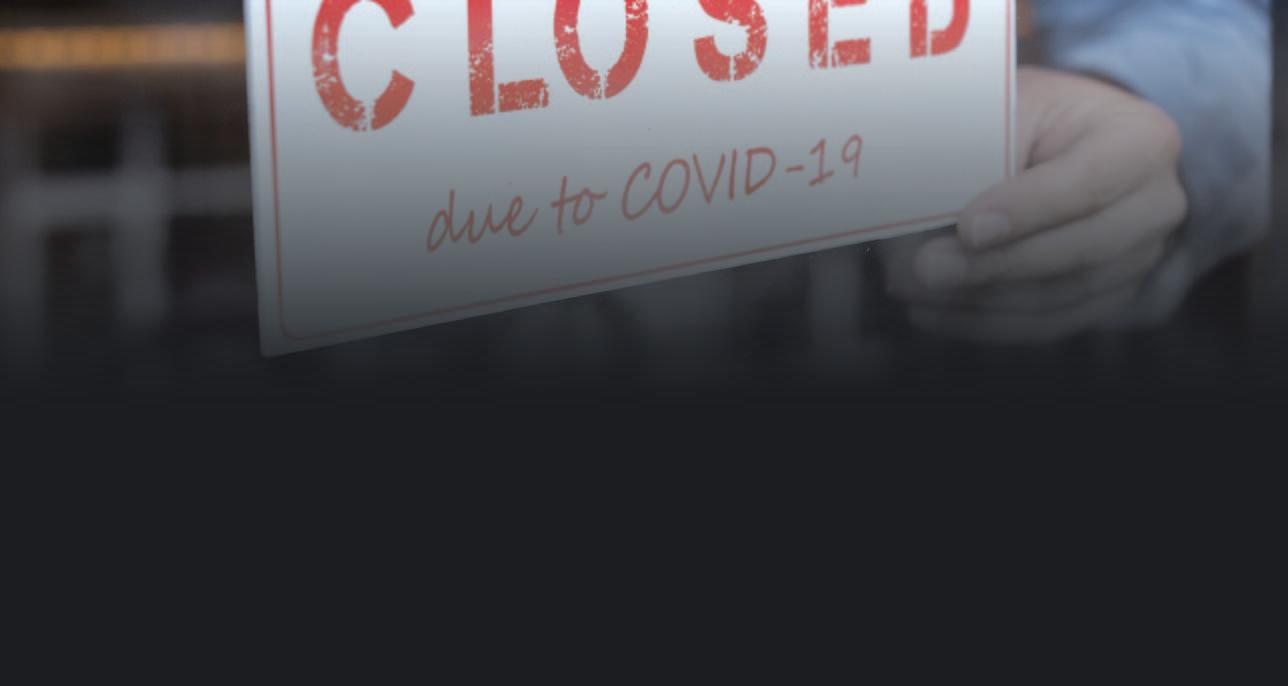

 Martin Canny BL
Martin Canny BL
The outbreak of Covid-19 in Europe in March 2020 was remarkable; the draconian medico-legislative response was unprecedented. This article discusses the state of the law on business interruption insurance claims by business policyholders for losses suffered as a result of the Covid-19 pandemic and the ‘Covid lockdown’ restrictions.
The outbreak of Covid-19 in Europe in March 2020 was remarkable; the draconian medico-legislative response was unprecedented.
Property insurance and business interruption insurance
As is stated in Buckley on Insurance Law:1 “A property damage policy does not cover loss of profits, or loss of market or delay arising from damage to property by an insured peril. Loss of profits, and additional costs incurred as a consequence of damage to property, can be insured under policies variously referred to as business interruption, consequential loss, or loss of profits policies”.
The phrase ‘business interruption insurance’ has no fixed meaning and is instead the heading for a range of policy wordings that cover loss of profits and additional costs of working, but always only to the extent provided by the policy and subject to policy limits. In understanding the difference between property and business interruption cover, the following comparison derived from Riley on Business Interruption Insurance2 is helpful:
“Property damage cover involves the measurement of something that has already happened (past) and relates to tangible assets; quantum is largely fixed and can be precisely measured and ignores independent impacts after the damage occurred. By contrast, business interruption cover commences from day of the damage (future) and relates to intangible revenue/costs; quantum will grow very quickly and will be imprecise and reflects impacts after damage that would have occurred (reducing the indemnity sum)”.
The arrival of Covid-19 and the public health restrictions in 2020
The time before Covid seems a long time ago now. On February 20, 2020, Covid-19 was made a notifiable disease by the Infectious Diseases (Amendment) Regulations 2020.3 The first diagnosed case in this jurisdiction was on February 29, 2020, as announced by the National Public Health Emergency Team (NPHET). On March 11, 2020, the World Health Organization (WHO) declared the Covid-19 outbreak a global pandemic. Speaking from Washington DC on Thursday, March 12, 2020, Taoiseach Leo Varadkar TD announced that schools, colleges and childcare facilities would close for two weeks from 6.00pm that day.4 Following discussions with the Licenced Vintners Association (LVA) and the Vintners Federation of Ireland (VFI), the Government called on all public houses and bars (including hotel bars) to close from Sunday, March 15, until at least March 29, 2020. On April 8, 2020, the Health Act 1947 (Affected Areas) Order 20205 declared the State (being every area or region thereof) as an area where there is known or thought to be a sustained human transmission of Covid-19. Also on April 8, 2020, the Health Act 1947 (Section 31A – Temporary Restrictions) (Covid19) Regulations 20206 were enacted by the Minister for Health, Simon Harris TD, giving a legal basis for closure orders. The closure restrictions were extended and public houses were only permitted to reopen from June 29, 2020, until mid-September 2020. Dublin then returned to ‘Level 3’ of the restrictions on September 18, 2020 (which imposed a ban on indoor dining and limited weddings to 25 guests). The rest of the country followed from midnight on October 6, and then all of the country was moved to ‘Level 5’ of the restrictions from midnight on October 21, 2020, and remained so until December 1, 2020. On that date, “non-essential” retail shops, hair and beauty providers, gyms and leisure centres, cinemas, museums and galleries were
permitted to open, and on December 4, 2020, restaurants, cafés, gastropubs and hotel restaurants re-opened after six weeks of closure. An explosion of cases then led to the country returning to Level 5 restrictions on December 24, 2020, which remained in place until June 2021.
The cases that have come before the courts in the UK and Ireland have featured businesses that had obtained property insurance containing an extension of cover in respect of business interruption losses, often added for a relatively modest additional premium. By contrast, the perspicacious risk committee of Wimbledon LTC, which runs the Wimbledon tennis tournament each year, paid a £1.5m annual premium for event cancellation cover due to infectious disease after the 2003 SARS outbreak (i.e., £25.5m over 17 years).
When the 2020 event was cancelled, it recovered £114 million on an insurance claim.7 Similarly, the National Collegiate Athletic Association (NCAA) is reported to have paid $2 million for cancellation cover for many years, but recovered $270 million upon the cancellation of its “March Madness” 64-team college basketball tournament in 2020.8 Applying a mathematical/economic analysis of the cost of cover in these transactions, it cost just under 1.5% of the insured sum per annum. For a mid-sized Dublin hotel with a turnover of ¤10 million this would have cost ¤150,000 for just this policy extension. This was not a feature of insurance placements in the Irish market prior to Covid-19 for hotels, bars and restaurants
There was also one actual policy of insurance specifically intended to insure against losses occurring in the event of a pandemic. ‘PathogenRX’ was an insurance policy designed by the broker Marsh in conjunction with health research firm Metabiota to provide business interruption coverage in the event of a pandemic, but few businesses were convinced that this was worth the cost of the cover provided.9
The types of business interruption clauses policyholders sought to rely upon
While other policy extensions also feature to a lesser extent in the test cases, the clauses that policyholders have sought to rely upon in their Covid-19 claims are ‘disease clauses’, and the related ‘hybrid’ clauses and ‘prevention (or denial) of access’ clauses.
As stated in the English High Court in FCA v Arch Insurance (UK) Limited and others , 10 “disease clauses … in broad terms, provide coverage in respect of business interruption in consequence of or following or arising from the occurrence of a notifiable disease within a specified radius of the insured premises”.
Hybrid clauses
A hybrid clause contains that same first element of, e.g., occurrence or outbreak of a notifiable disease within a certain radius of the premises, and a second element, namely restrictions imposed by order of government or statutory authority or, as stated in FCA v Arch Insurance (UK) Limited and others:11 “[It is] a convenient means of referring to certain policy terms, which refer both to restrictions imposed on the premises and to the occurrence or manifestation of a notifiable disease”.
Prevention of access clauses
A ‘prevention of access’ (or ‘denial of access’) clause not requiring property damage was described in FCA v Arch Insurance (UK) Limited and others12 as providing cover “… where there has been a prevention or hindrance of access to or use of the premises as a consequence of government or local authority action or restriction”.
The test case framework in the UK and Ireland Insurers treasure certainty. They also have deep pockets and knowledge of likely court outcomes and litigation strategies; hospitality businesses do not view expensive litigation as an enjoyable contact sport.
The English Financial Conduct Authority (FCA) responded to the situation by invoking its Financial Markets Test Case Scheme13 for the first time. It reached agreement with eight major insurers in a Framework Agreement on May 31, 2020.14 The agreement provided that the FCA would act as claimant in proceedings against the eight insurers seeking declaratory relief on policy cover for Covid-19 losses on 21 sample policy wordings to reduce litigation costs for the benefit of insurers and policyholders, and to lead to expedited resolution of core issues.15
The FCA test case came on for hearing as an eight-day trial on July 20, 2020, with judgment delivered by the English High Court on September 15, 2020.16 A leapfrog appeal led to the UK Supreme Court delivering judgment on January 15, 2021.17
In this jurisdiction, the companies behind four public houses (the Dublin triptych of The Leopardstown Inn, Sinnotts, Lemon & Duke and, in addition, Sean’s Bar in Athlone) instituted suit in May 2020 claiming an entitlement to cover from FBD Insurance. Two companies had recently moved their business to FBD, as it offered better cover, and one company had received specific confirmation in February 2020 that the FBD policy covered Covid-19-related closures. With the benefit of hindsight, it is now apparent that these plaintiffs had unrepresentatively strong cases. The trial lasted 11 days in October 2020 and Mr Justice McDonald delivered judgment on February 5, 2021.18
After the FBD test case proceedings had been issued, the Central Bank of Ireland’s (CBI) Supervisory Framework guidance document, dated August 5,
2020, was published, and it continues in force. This guidance document encouraged insurers to identify cases suitable for “test case” status for a ruling on the policy’s meaning for the benefit of all policyholders. The CBI also encouraged the insurer to pay the policyholder’s legal costs. However, it did not require insurers to identify a test case. While the details of the payments to policyholders are not a matter of public record, there was no obligation to pay appeal costs and quite possibly this is why none of the judgments have been appealed to the Court of Appeal. In its own way this has assisted in achieving consistency, as all the substantive19 judgments were delivered by Mr Justice McDonald in the Commercial List.
The policyholders secured a favourable outcome on many of the policies considered in FCA v. Arch, and the plaintiffs in the FBD test case secured an emphatic victory.20
The subsequent Irish test cases: the insurers strike back
The second Irish test case judgment was delivered on April 19, 2021, in Brushfield Limited trading as Clarence Hotel v AXA 21 In claiming an entitlement to cover, the Clarence Hotel was not able to point to any cases of Covid-19 on the premises. The first issue was whether a ‘murder, suicide, or disease clause’ (MSDE) provided cover. This, in turn, led to the question of whether Covid-19 was a subset of, or was captured by “acute encephalitis”? The second issue related to the interpretation of a denial of access (non-damage) (NDDA) extension. In this regard the Court had to rule on whether Covid-19 was a “danger or disturbance” within one mile of the premises leading to closure by the police or statutory body.
Mr Justice McDonald held, firstly, that there was no evidence that acute encephalitis is caused by Covid-19, so the MDSE extension was not engaged. In relation to the second issue, he held that in principle the occurrence of a notifiable disease can constitute a “danger” but the plaintiff could not establish that the Government measures in March 2020 were prompted by concerns about a danger within one mile of the Clarence Hotel.22
The test case judgment on a Zurich policy was delivered on September 24, 2021, in Headfort Arms Limited trading as The Headfort Arms Hotel v Zurich Insurance Plc.23 The Zurich policy provided business interruption cover for “damage by any cause not excluded…” and the question was whether this required physical damage. It was held by McDonald J. that having regard to the policy as a whole, it required physical damage to property and was not engaged by an outbreak of Covid-19. 24 The same issue came before the court in Coachhouse Catering Limited v Frost Insurance Limited and Zavarovalnica Sava Insurance Company DD,25 where inconsistent wording in the policy was noted by the Court. However, ultimately the finding was that physical damage to property was a requirement for a successful claim on the prevention of access clause. In response to arguments that Covid-19
can live on surfaces, the Court held that there was no evidence of contamination of the physical building.
The most recent Irish test case judgment at the time of writing was delivered on March 30, 2022, in Premier Dale trading as Devlin Hotel v RSA Insurance Ireland DAC.26 The hybrid clause in this policy provided cover in the event of losses caused by Government-ordered closure of the premises as a result of “a notifiable human disease manifesting itself at the premises”. The Court received expert evidence from the plaintiff on “background prevalence”27 of Covid-19 within the country based on NPHET statistics, which was then used to estimate the likelihood of an infected person having been “at the premises”.
Mr Justice McDonald held that a disease only “manifested” itself if there was either: (i) a symptomatic case of a notifiable disease at the premises; (ii) a diagnosed case of a notifiable disease at the premises; or, (iii) the detection of the causative pathogen at the premises.28 None of these were established, and in fact the Devlin Hotel’s Replies to Particulars and the “agreed facts” for the case did not allege that any of these limbs were satisfied.29 Ultimately, the pleaded case and agreed facts fell short of establishing any contestable factual dispute relevant to entitlement to cover. At the time of writing, judgment is eagerly awaited in Marlin Apartments Limited t/a Marlin Hotel Dublin v Allianz Plc. This test case on the Allianz policy terms will consider a hybrid clause that provided cover in the event of an ordered closure following the “occurrence” of a notifiable disease “at the premises”. The Court heard expert evidence on background prevalence again, which was challenged on the grounds that NPHET’s per-county data includes all infections (including healthcare positive tests) and therefore should not be accepted as a proxy for what was occurring at a particular business premises. In addition, there may be some further analysis on the necessary causal link between evidence of a small number of cases at a premises and the imposition of nationwide restrictions.
The UK litigation: faraway grass not actually any greener
Until recently, the good intentions of the drafters of the CBI’s Supervisory Framework of August 5, 2020, appeared less useful than the FCA’s approach in getting early guidance on 21 policy wordings.
In a significant judgment following FCA v Arch, the English High Court in Corbin & King Limited v AXA Insurance UK Plc30 ruled on whether a policyholder was entitled to cover on an NDDA clause. Ms Justice Cockerill held that Covid-19 was a “danger or disturbance” occurring within one mile of the premises causing Government-ordered closures, favouring policyholders over insurers. While one may agree or disagree with the actual decision, it did provide clear guidance and was not appealed.
However, the limited facts considered in FCA v Arch and the unappealed judgment in Corbin & King have now led to unforeseen difficulties, as other
insurers disagree with Corbin & King’s findings on the law. This has led to the defendant insurers in two significant actions (London International Exhibition Centre Ltd v RSA31 and Gatwick Investment Ltd and ors v Liberty Mutual Insurance Europe SE)32 being bound by Corbin & King at first instance but indicating that they will be challenging it on appeal to the Court of Appeal. This leaves resolution of some important issues until the Court of Appeal delivers judgment in those appeals in late 2024 or 2025.
Another issue arising from the judgment in London International Exhibition Centre Ltd v RSA33 arises from the Court receiving statistical evidence and its role in establishing likelihood of an occurrence at the premises. The problem is that the sheer size of the ExCeL Centre means that any guidance may be of limited relevance for small venues where facts are not agreed. And although it may simply reflect different factual scenarios in the different cases, the issue of ‘aggregation’ (i.e., whether a policyholder has a single or multiple claims arising out of the closure of multiple premises or premises on multiple occasions by reason of the Covid-19 pandemic) continues to lead to different outcomes in cases.34
While initial comment on the English test case in FCA v. Arch might well have marvelled at the efficiency of what it achieved, a more considered view leads one to see that some disputes inevitably require further analysis on the facts and the law. The thorough and rigorous approach of Mr Justice McDonald in the Irish Commercial List test cases has led to a series of detailed judgments grounded on admissible evidence relevant to the disputes at issue.
The Covid-19 pandemic led to enormous business losses in Ireland. None of the business insurance policies purchased by Irish businesses (in 2019) had been drafted to expressly provide business interruption cover in respect of those losses. The courts have therefore been asked to interpret the language of policies to ascertain whether they provide cover in respect of losses that were not subjectively or expressly in their contemplation.
The case law on extensions of cover for prevention/denial of access show that some policies, properly interpreted, do require physical damage to property (Coachhouse Catering) but that other policies will permit a claim when the restrictions on access arose as a result of Covid-19 (Brushfield Limited). However, the cases within the relevant radius that is considered by the policy must meet the relevant test for causation of the restrictions (Brushfield Limited).
The FBD test case plaintiffs had strong claims on their policies. The subsequent cases have identified major differences between the FBD policy wording (which contained a 25-mile radius clause) and the policies offered by other insurers such as RSA, AXA, Zurich and Allianz, which typically require
the occurrence or manifestation of the infectious disease at, in or on the premises for cover on their disease or hybrid clauses.
The difficulties in attempting to rely upon NPHET figures on rates of infection and numbers of cases to extrapolate the statistical likelihood of an infected person having been present at the premises are apparent from the judgment in Premier Dale Ltd and it may simply be the case that the data is not sufficiently granular to apply to an individual business. Instead, for many of the mainstream
1. Buckley, A.J., Buckley, D. Buckley on Insurance Law (5th ed.). Round Hall, Dublin, 2021: Para 18-01.
2. Glynn, D., Rogers, T. Riley on Business Interruption Insurance (11th ed.) Sweet & Maxwell, London, 2021: Preamble [xi].
3. S.I. No. 53 of 2020. Covid-19 is the “infectious disease” with the causative pathogen being “SARS-CoV-2”.
4. Leahy, P. ‘Coronavirus: Schools, colleges and childcare facilities in Ireland to shut’. The Irish Times, March 12, 2020. Available from: https://www.irishtimes.com/news/health/coronavirus-schools-colleges-and-childcarefacilities-in-ireland-to-shut-1.4200977
5. S.I. No. 120 of 2020. Curiously, this Order does not appear to have any legal significance in the context of whether there was a case of Covid-19 at a premises, from the perspective of policy cover.
6. S.I. 128 of 2020.
7. Ruel, C. ‘Wimbledon set for coronavirus windfall in huge payout from pandemic insurance.’ Insurance Times, April 14, 2020. Available from: https://www.insurancetimes.co.uk/news/wimbledon-set-for-coronavirus-windfall-inhuge-pay-out-from-pandemic-insurance/1433146.article; Dutton, J. ‘Wimbledon ‘will receive £114m in compensation’ for cancelling this year’s tournament due to coronavirus after taking out ‘pandemic insurance’ following SARS outbreak in 2003.’ The Daily Mail, April 9, 2020. Available from: https://www.dailymail.co.uk/sport/tennis/article8202449/Wimbledon-receive-114m-compensation-cancelling-years-tournament.html
8. Hobson, W. ‘The NCAA saved money in case of a cancelled March Madness. Then it spent it.’ The Washington Post, April 21, 2020. Available from: https://www.washingtonpost.com/sports/2020/04/21/ncaa-saved-money-casecanceled-march-madness-then-it-spent-it/
9. Goyder, B., Smythe, C. ‘Pandemic product saw no takers before coronavirus.’ Insurance Insider. Available from: https://www.slipcase.com/view/inside-in-full-pandemicproduct-saw-no-takers-before-coronavirus-marsh-broker
10. [2020] EWHC 2448 (Comm) at para 81.
11. [2020] EWHC 2448 (Comm) at para 242.
12. [2020] EWHC 2448 (Comm) at para 306.
13. CPR Part 63A.
disease and hybrid clauses, an insurer will be entitled to insist that a plaintiff produce evidence of an identifiable person who has a confirmed diagnosis of Covid-19 (e.g., the HSE text message confirming diagnosis) who was physically present at the premises on a specific date. Even then, the question of the relevant test for causation of Covid restrictions from an individual or a limited number of cases continues to trouble the courts, with further judgments likely to touch upon on that issue in both the UK and in Ireland.
14. Business Interruption Insurance Test Case Framework Agreement. Available form: https://www.fca.org.uk/publication/corporate/bi-interruption-test-case-frameworkagreement.pdf
15. Framework Agreement, Recital G.
16. FCA v Arch Insurance (UK) Limited and others [2020] EWHC 2448 (Comm).
17. [2021] UKSC 1, [2021] 2 W.L.R. 123.
18. Hyper Trust Limited t/a Leopardstown Inn v FBD Insurance Plc [2021] IEHC 78. Though not discussed herein, the subsequent rulings are worthy of attention: (No. 2) [2021] IEHC 279 (on “closure”), (No. 3) [2022] IEHC 39 (“trends and circumstances” and bar counter restrictions), and (No. 4) [2023] IEHC 355 (deduction of Government supports and calculation of losses).
19. Barniville P. also delivered a notable judgment in Charwin Ltd t/a Charlie’s Bar v Zavarovalnica Sava Insurance Company DD [2021] IEHC 489, in which he stayed contractual claims in favour of arbitration but refused to stay the claims of breach of statutory duty alleged against the insurer defendant.
20. Canny, Pietrocola. Business interruption insurance and losses caused by Covid-19. Commercial Law Practitioner 2021; 28 (3): 43.
21. [2021] IEHC 263.
22. [2021] IEHC 263 at para 187.
23. [2021] IEHC 608.
24. [2021] IEHC 608 at para 79.
25. [2022] IEHC 306.
26. [2022] IEHC 178.
27. [2022] IEHC 178 at para 31.
28. [2022] IEHC 178 at para 120(b).
29. [2022] IEHC 178 at para 5(i).
30. [2022] EWHC 409 (Comm), [2023] 1 All ER (Comm) 429.
31. [2023] EWHC 1481 (Comm).
32. [2024] EWHC 83 (Comm).
33. [2023] EWHC 1481 (Comm).
34. Compare Corbin & King v AXA Insurance UK Plc [2023] 1 All ER (Comm) 429 and Various Eateries Trading Ltd v Allianz Insurance Plc [2024] EWCA Civ 10.



Article 4a of the 2002 Framework Decision on the European arrest warrant is intended to bring clarity to the issue of fair trial rights for persons convicted in absentia; however, case law would indicate that complexities remain.

 Kieran Kelly BL
Kieran Kelly BL
The 2002 Framework Decision (FD) on the European arrest warrant,1 which led to the enactment of the European Arrest Warrant Act 2003 (EAWA),2 was designed to streamline surrender procedures and to initiate a simplified and more effective system for the surrender of persons. The aim of this was to facilitate and accelerate judicial co-operation with a view to contributing to the objective set for the European Union to become an area of freedom, security and justice.3 The EAW scheme is founded on a high level of confidence between the member states, and has been described as the “cornerstone” of judicial co-operation.4 The decision on the execution of an EAW, i.e., to decide whether or not to order surrender, is vested in the judicial authority of the member state where the requested person has been arrested. The High Court is the designated “executing judicial authority” in Ireland.5
Subject to the obligation to respect fundamental rights and fundamental legal principles, member states are obliged to execute EAWs in accordance with the provisions of the FD on the basis of the principle of “mutual recognition”.6 Article 3 of the FD specifies mandatory grounds for the non-execution of EAWs and Article 4 outlines grounds for optional non-execution. Article 5.1 (since replaced by Article 4a) had provided for guarantees to be given by the issuing member state in respect of fair trial rights in circumstances where the EAW sought the surrender of a person convicted in absentia. However, because of practical complications in the implementation of Article 5.1 – including that it was “difficult to know exactly when execution may be refused” – Article 5.1 was deleted and replaced by Article 4a of Framework Decision 2009/299 JHA7 (2009 FD).8
Article 4a expressly recognises that the right to a fair trial includes the right of accused persons to appear in person at their trials as provided for in Article 6 of the Convention,9 but it appreciates that this is not an absolute right. There are circumstances where accused persons, of their own free will, may expressly or tacitly, but “unequivocally”, waive the right to attend their trial. Article 4a was intended to bring clarity and to provide common grounds for the non-recognition of in absentia decisions. Further, it outlines alternative circumstances and conditions that, if satisfied, preclude the refusal of surrender of a person who did not appear in person at the trial resulting in the relevant decision.
Part (d) inserted in the annex of the FD10 includes a table that mirrors the various options by which the issuing judicial authority can provide the relevant assurance to the executing judicial authority to safeguard the fair trial rights of the requested person. That table is designed to readily confirm either that the requested person was present at the trial that resulted in the relevant decision or, if not in attendance, that one or more of the relevant prescribed conditions apply. The issuing judicial authority can quite simply give this assurance by completing the relevant
section of the table (i.e., by ticking the appropriate box and providing some detail). The Article 4a table has also been incorporated into a duly amended Section 45 of the EAWA.11
The logic is that where one or more of the exceptions to the table apply, the requested person’s defence rights will not be infringed because he or she will either be deemed to have waived his or her right to be present at the trial resulting in the decision (Article 4(1)(a-b)), or will be entitled to a retrial or an appeal on the merits (Article 4a(1)(c-d). In such circumstances, surrender may not be refused.12 However, where the table has not been properly completed and/or where there is no information on the protection of defence rights, the High Court may refuse surrender, but is not obliged to do so.
At first blush, Article 4a might appear to have introduced clarity and certainty to the equation, but that has not been the experience on the ground. Article 4a has been the subject of several decisions by the Court of Justice of the European Union (CJEU) and it is often the only real battleground in many of the contested surrender applications and appeals that come before the superior courts concerning in absentia sentence EAWs. Two regularly recurring themes in this regard are: what constitutes the “trial resulting in the decision” for the purposes of Article 4a; and, when might surrender be ordered even though none of the express exceptions outlined in Article 4(a)(1) apply? This in turn triggers a consideration of the concept of “unequivocal waiver”.
In Tupikas, 13 the CJEU observed that the FD must be interpreted in such a way as to ensure respect for the fundamental rights of the persons concerned but without calling into question the effectiveness of the system of judicial co-operation between the member states of which the EAW is a key element.
The concept of a “trial resulting in the decision”, when regarded as an autonomous concept of EU law, is interpreted uniformly throughout the EU as referring to the proceedings that led to the judicial decision which finally sentenced the person whose surrender is sought by means of the EAW.
Such proceedings determine the quantum of the sentence that the convicted person will ultimately serve; the person must be able to effectively exercise his or her rights of defence to influence the decision. The guarantees laid down in Article 6 of the European Convention on Human Rights (ECHR) apply not only to the finding of guilt, but also to the determination of the sentence. Therefore, compliance with the requirement of a fair trial includes the right of the person concerned to be present at the subsequent hearing because of the significant consequences that it may have on the quantum of the sentence to be imposed. The rights of the defence must be observed in respect of both the finding of guilt and the final determination of the sentence and, where those two aspects are dissociated, the final decisions handed down must, in the same way, be subject to the verifications required by Article 4a. In Ardic, 14 the CJEU held that where a party is found guilty at criminal proceedings
at which he or she attended in person, but where the judge imposes a conditionally suspended custodial sentence, the concept of trial resulting in the decision, as referred to in Article 4a(1) does not include subsequent proceedings such as a revocation hearing at which that suspension is revoked and the sentence activated on grounds that the conditions of suspension were infringed, provided that the revocation decision does not change the nature or the quantum of the initial sentence.
In the joint cases of LU and PH, 15 the CJEU was called upon to consider the effect of the non-attendance of the parties at criminal proceedings further back in the chain but which impacted on the sentence that was the subject matter of the EAWs. The Court held, inter alia, that Article 4a (1) must be interpreted as meaning that where the suspension of a custodial sentence is revoked, on account of a new criminal conviction, and an EAW for the purpose of serving that sentence is issued, that criminal conviction, handed down in absentia, constitutes a ‘decision’ within the meaning of Article 4a(1). In such circumstances it is appropriate that a Table d should be completed for all convictions that feed into the final decision, as each decision is to be regarded as a trial resulting in the decision. The Supreme Court has recently decided16 to refer questions to the CJEU on “nature and quantum”, and in that regard whether court proceedings leading to the imposition of a custodial sentence for violating a sentence of police supervision constitutes a “trial resulting in the decision” for the purposes of Article 4a(1), where the Court had a discretion whether to impose a custodial sentence but did not have a discretion as to the duration of the sentence.
Under Section 45 of the EAWA,17 the High Court may refuse to order the surrender of a person unless the EAW indicates the matters required by points 2, 3 and 4 of point (d) of the Table.18 In Dworzecki,19 a summons sent to the address provided by the requested person was collected by his grandfather but he had not attended at the trial that led to his conviction and sentence. The CJEU concluded that “summoned in person” and “by other means actually received official information of the scheduled date and place of that trial in such manner that it was unequivocally established that he or she was aware of the scheduled trial” as outlined in Article 4a(1) constituted “autonomous concepts of EU law” that must be interpreted uniformly throughout the EU. It held that the methods of effecting service of the summons provided for in Article 4a(1)(a)(i), by their precise and common nature, are designed to ensure a high level of protection and to allow the executing authority to surrender the person concerned notwithstanding his failure to attend the trial that led to his conviction, while fully respecting the rights of the defence.20
Compliance with the conditions for a summons referred to in Article 4a(1)(a)(i) is apt to ensure that the person concerned was informed in good time of the date and place of his trial, and thus allows the executing authority to conclude that the
rights of the defence were respected.21 In the context of such an assessment of the optional ground for non-recognition, the executing judicial authority may thus have regard to the conduct of the person concerned. It is at this stage of the surrender procedure that particular attention might be paid to any manifest lack of diligence on the part of the person concerned, notably where it transpires that he or she sought to avoid service of the information addressed to him or her.22
In Zarnescu, 23 the Supreme Court upheld a High Court refusal to surrender to serve a sentence that had been upheld at second instance following an appeal in the issuing state. The relevant summons had been received by the requested person’s father but because there was no direct evidence that his father had communicated the contents to him there was a doubt as to whether the person was aware and that a decision could be made at the hearing despite his absence. The Supreme Court noted that the primary concern in such cases is to ascertain whether there is a sufficient degree of actual knowledge to enable a court to form a view that an in absentia hearing could safely be judged as not amounting to a breach of defence rights. Mr Zarnescu successfully contended that his failure to follow up on his request for the adjournment of his appeal hearing did not constitute an unequivocal waiver of rights and, therefore, his defence rights were breached when his appeal proceeded in his absence. Following Dworzecki, the Supreme Court agreed that service based on “a legal fiction”, such as domestic rules of practice that permit service to be “deemed good”, is not sufficient to establish actual knowledge which, in turn, is the foundation of the analysis of whether non-attendance at a hearing was sufficiently informed to amount to an “unequivocal waiver”.
The Supreme Court noted that under CJEU and national case law several principles have evolved to meet the “understandable reluctance of a requested state to return a person when doubts exist as to the knowledge of the person of the scheduled date for trial or sentence”. An acceptable balance between respect for the legal order of another member state and mutual co-operation on one hand, and the rights of the requested person on the other hand, is not always easy to achieve.
The Supreme Court distilled several principles from a review of the authorities.24
In LU and PH, 25 the CJEU has since confirmed the foregoing position where it held that an executing judicial authority may not under Article 4a(1) of Framework Decision 2002/584 refuse to surrender a requested person to the issuing member state where the EAW contains, in respect of the criminal conviction handed down in absentia, one of the statements mentioned in points (a) to (d) of Article 4a(1).26
Conversely, where the EAW does not contain any of the statements mentioned in Article 4a(1)(a) to (d), the executing judicial authority must be able to refuse to surrender the requested person, irrespective of whether the essence of his or her rights of defence have been infringed, since no requirement of that kind follows either from the wording of Article 4a or from its objective.
In Szamota, 27 when it came to apply LU and PH, and having due regard to other decisions, including Zarnescu, 28 the Court of Appeal noted that the CJEU had made it clear that the executing judicial authority may take into account other
circumstances, including the conduct of the requested person, that enable it to satisfy itself that the surrender of the person concerned does not entail a breach of his or her rights of defence. Such circumstances may include the fact that he or she sought to avoid service of the information addressed to him or her or to avoid any contact with his or her lawyers.29 The Court of Appeal in Szamota30 noted that it was clear from Zarnescu31 that the provisions of section 45 EAWA are not exhaustive and that, in certain circumstances, a court may order surrender even where none of the conditions set out in section 45 are satisfied. However, the Court noted that the existence of such a discretion raises the question of how it is to be exercised. While the Court of Appeal did not offer a conclusive view, it observed that the fundamental rule under the FD is that EAWs should be executed and that exceptions to that fundamental rule are to be narrowly construed. The Court concluded that it would appear to follow that where the Court is satisfied in a given case that surrender would not entail a breach of the rights of the defence, then, in the absence of any countervailing factors, an order for surrender ought normally to be made.
Since the judgement in Szamota, the UK Supreme Court has delivered its judgement in Bertino, 32 where the sole issue was whether the appellant had “deliberately absented himself from his trial” – a phrase that was deemed to be synonymous with the concept of “unequivocal waiver”. Having regard to the “capital” importance of the right of defendants to be present at their trials as outlined in European Court of Human Rights (ECtHR) jurisprudence,33 and also that a fair hearing requires that defendants are notified of the proceedings against them,34 it was the responsibility of the requesting judicial authority to prove to the criminal standard that the appellant had unequivocally waived his right to be present at his trial. The issue of “reasonable foreseeability” feeds into the submission that an accused must be told that the trial may proceed in his or her absence in the event of non-attendance in accordance with the notification of trial. The Supreme Court held that the person concerned needed sufficient awareness of the circumstances to waive a right by a “knowing, voluntary and intelligent act” and “having been advised of his rights” may validly renounce them. Having regard to the facts in issue, the UK Supreme Court concluded that the appellant had not unequivocally waived his right to be present at his trial.
The adequacy of the notice given to the person and whether he had been warned of the consequences of non-attendance in accordance with Article 4(a)(1,) was the core issue in Szlachikowski 35 The Court of Appeal upheld the refusal of the High Court on Article 4/Section 45 grounds of a request made under Article 27.4 of the FD, as reflected in section 22 of the EAWA, which invokes the same criteria as a surrender request, in relation to the further prosecution of a person who had already been surrendered on an EAW for a different matter.
The Court of Appeal ruled following a comprehensive consideration of relevant ECtHR and CJEU jurisprudence, domestic precedent including Zarnescu36 and Szamota,37 and other persuasive external authorities, including Bertino.38 The Court
held that the ECtHR jurisprudence had been correctly interpreted, and as Bertino established, for a waiver to be unequivocal and effective, ordinarily the accused must be shown to have appreciated the consequences of his or her behaviour. The Court of Appeal held that while manifest lack of diligence can certainly contribute to a justified conclusion of unequivocal and effective waiver, it is hard to see how it could justify such a conclusion per se – more is required.39 However, depending on the circumstances of the case, manifest lack of diligence, coupled with other circumstances, might cumulatively support an inference of unequivocal and effective waiver.
While the many legal issues that have arisen have been clarified, the High Court is nonetheless regularly required to conduct intensive fact-specific inquiries and to engage, through the Central Authority, in communications with issuing judicial authorities to ascertain pertinent detail. In that regard it
References
1. 2002/584/JHA: Council Framework Decision of June 13, 2002, on the European arrest warrant and the surrender procedures between member states.
2. As amended. The European Arrest Warrant Acts 2003 and 2012 and the European Arrest Warrant (Amendment) Act 2024 may be cited together as the European Arrest Warrant Acts 2003 to 2024.
3. Aranyosi and Caldararu C-404/15 para 76.
4. So described by the European Council. See Recital 6 of 2002/584/JHA.
5. Section 9 EAWA.
6. See, inter alia, Melloni, C-399/11, and Lanigan, C-237/15 PPU.
7. Framework Decision 2009/299 JHA amending Framework Decisions 2002/584/JHA, 2005/214/JHA, 2006/783/JHA, 2008/909/JHA, and 2008/947/JHA, thereby enhancing the procedural rights of persons and fostering the application of the principle of mutual recognition to decisions rendered in the absence of the person concerned at the trial. See Recital 3 re difficulties with preceding Article 5.1 of 2002/584/JHA.
8. Entered into force on March 28, 2009.
9. Convention for the Protection of Human Rights and Fundamental Freedoms.
10. Inserted by the 2009 FD.
11. That since the coming into force of the European Arrest Warrant (Amendment) Act 2024 on May 1, 2024, per S.I. No. 80 of 2024, the European Arrest Warrant (Amendment) Act 2024 (Commencement) Order 2024 provides optional grounds to refuse surrender in lieu of what appeared, at least on a literal interpretation, to be mandatory grounds.
12. Section 45 as amended by the European Arrest Warrant (Amendment) Act 2024.
13. Case C-270/17 PPU, August 19, 2017.
14. Case C-571/17 PPU, December 22, 2017.
15. LU (C 514/21) and PH (C-515/21).
16. MJE v Radionovs [2023] IESC 37. Judgment delivered on December 14, 2023.
is apparent that Article 4a has not yet accomplished one of its primary stated objectives: that of rendering the process less complicated for the practitioner and aiding judicial co-operation. This failure may, in part, be due to issuing member states interpreting relevant principles in a domestic law context instead of within the autonomous concepts of EU law. Thus, before the full benefit of Article 4a is properly realised, it may be necessary to await further developments at an EU level to seek to approximate the laws of member states in the field of criminal law.
In the immediate short term, addressing issues surrounding the inadequate completion of tables and forms, and/or the quality of some of the translation, would greatly assist. Thus, while Article 4a is very well intentioned and has the capacity to be a very effective cog in the EAW scheme, it requires member states to embrace and to properly engage with it, and to appreciate the ECtHR requirements for a fair trial and the necessity to provide relevant information to the issuing judicial authority.
17. As amended in 2024. Hitherto on a literal reading section 45 mandated refusal where the requirements of Article 4a(1) were not satisfied but it was not always interpreted as such.
18. There is a broadly similar provision for UK Trade and Cooperation Agreement arrest warrants.
19. Case C-108/16 PPU, May 24, 2016.
20. Para 37.
21. Para 38.
22. Para 51.
23. [2020] IESC 59 per Baker J.
24. At para 90.
25. Joined Cases C-514/21 and C-515/21, a preliminary reference from this Honourable Court.
26. Para 74.
27. [2023] IECA 143 per Collins J. (note: the respondent was PH in C-515/21).
28. [2020] IESC 59.
29. Para 28.
30. [2023] IECA 143.
31. [2020] IESC 59.
32. [2024] UKSC 9, [2024] 1 WLR 1483.
33. Poitrimol v France (1993) 18 EHRR 130 para 35.
34. Colozza v Italy (1985) 7 EHRR 516, para 35.
35. Court of Appeal judgement delivered on May 10, 2024, per Edwards J.
36. [2020] IESC 59.
37. [2023] IECA 143.
38. [2024] UKSC 9, [2024] 1 WLR 1483.
39. Minister for Justice v Szlachikowski, May 10, 2024. Judgement of Edwards J. at para. 72.
The EU Pact on Migration and Asylum has caused concern among advocacy groups, but contains some key procedural improvements.
The EU Pact on Migration and Asylum (the Pact) isn’t perfect. However, it won’t necessarily lead to greater migration into Ireland. Neither is it composed of measures that will lead to procedural unfairness, as feared by some advocacy groups. When the proposed new legislation is actually read, it is apparent that there are some key procedural improvements that will make the system fairer. There are risks involved in any unilateral move by Ireland to refrain from signing up and leaving our system running the old laws while the rest of the EU implements a new one.
Measures
The Pact is composed of a number of measures. The Cabinet has agreed to opt in to seven, subject to approval by both Houses of the Oireachtas:
(a) Procedures Regulation;
(b) Regulation on asylum and migration management (replacing the Dublin system);
(c) ‘Eurodac’ Regulation;
(d) Qualification Regulation;
(e) Regulation addressing situations of crisis and force majeure in the field of migration;
(f) Reception Conditions Directive (recast); and,
(g) Regulation establishing a Union Resettlement Framework.
There are those who fear the Pact will lead to greater migration flows into Ireland and are concerned that the European Court of Justice will now have the final say on interpreting the substance of asylum law. In reality, that has been the position since the original Qualification Directive in 2006, and this has not caused any problems for the State. Concerns have

been raised that new burden-sharing obligations will lead to greater numbers of migrants into Ireland; in fact, any burden sharing may be a proportionate price of remaining within the European club as regards asylum and immigration.
Several key improvements in procedural fairness can also be identified. The asylum interview must now be the subject of a video or audio recording, shared with applicants and their lawyers before a decision. If applicants claim that inconsistencies in their account were down to a bad interpreter, this can be objectively assessed. This will also help authorities if the interpretation difficulty was manufactured. Further, there is a new right to have relevant documents translated. These improvements are not push factors that will attract more applicants. Rather, they are procedural improvements that should lead to fewer judicial reviews.
A reading of the relevant provisions shows that the border procedure manifestly does not mean mandatory detention. And it’s clearly and unambiguously stated in law that the border procedure must enable a complete and fair examination of claims. The courts, both in Dublin and Luxembourg, will not shy away from
condemning any implementation of the border procedure that leads to unfairness.
12-week time limit isn’t absolute When the border procedure is applied, an international protection application, including any appeal, must be determined within 12 weeks. But if a first-instance decision is not made within 12 weeks, the applicant must be authorised to enter the Member State’s territory. The obligation to ensure that the border procedure must enable a complete and fair examination of claims must be interpreted in light of the rights and principles contained in the EU Charter of Fundamental Rights. This surely means that notwithstanding the 12-week deadline, the authorities might in an appropriate case have to refrain from making a first-instance decision until an applicant who is awaiting an important piece of evidence, like an expert medical report, obtains it. Thus, the 12-week period is not the blunt instrument that is feared by some advocacy groups.
There is no interest group on either side that is entirely happy with the Pact—not necessarily a sign that it is bad. Rather, this may indicate an imperfect consensus based on compromise. There is a risk to Ireland’s interests if we are left implementing the old version of EU legislation, crudely tacked on to the new legislation in force everywhere else. The edges of the old system not seamlessly meeting those of the new is the sort of thing that could easily lead to generic judicial review arguments, applicable in every case, that could cause paralysis in decision-making.

